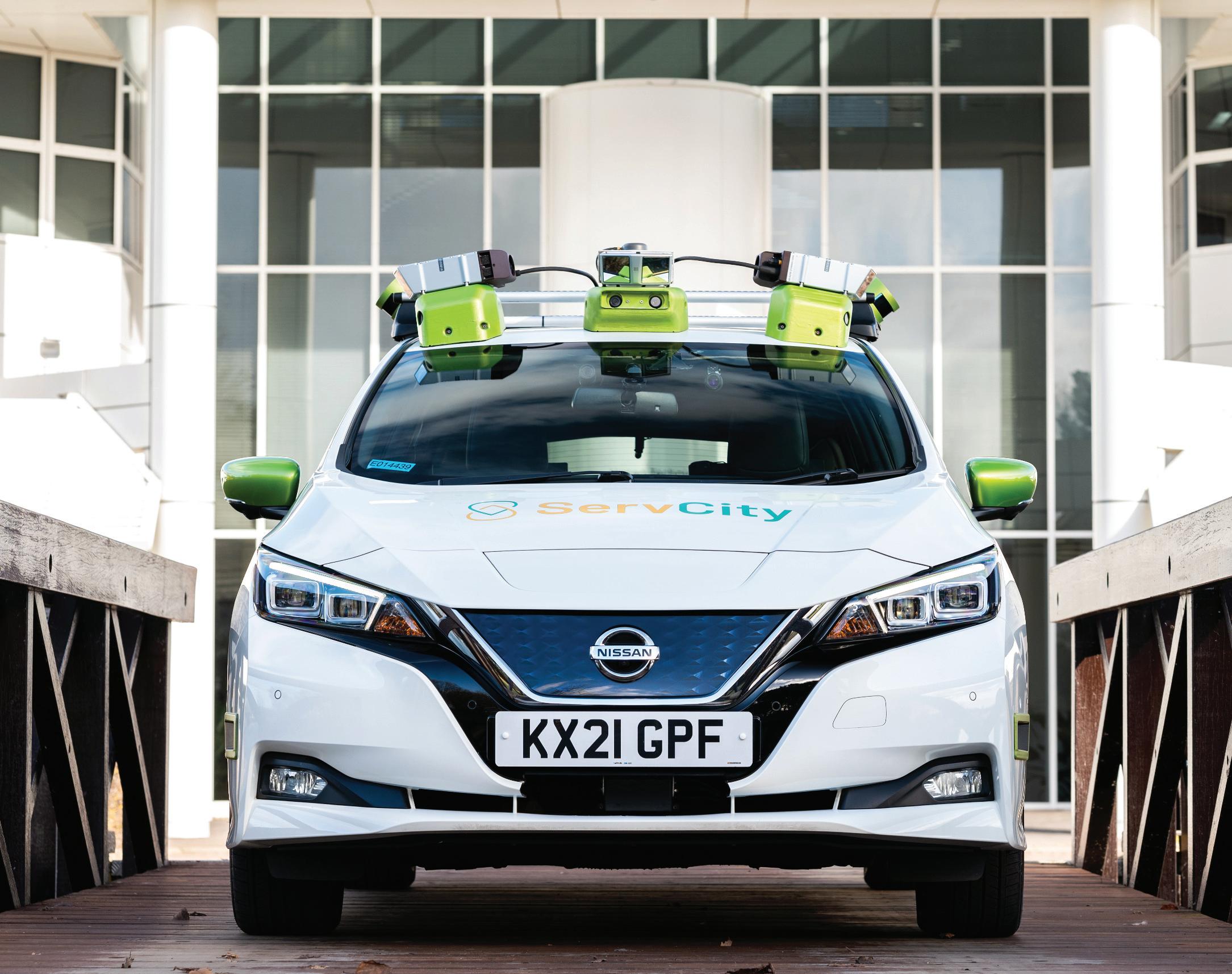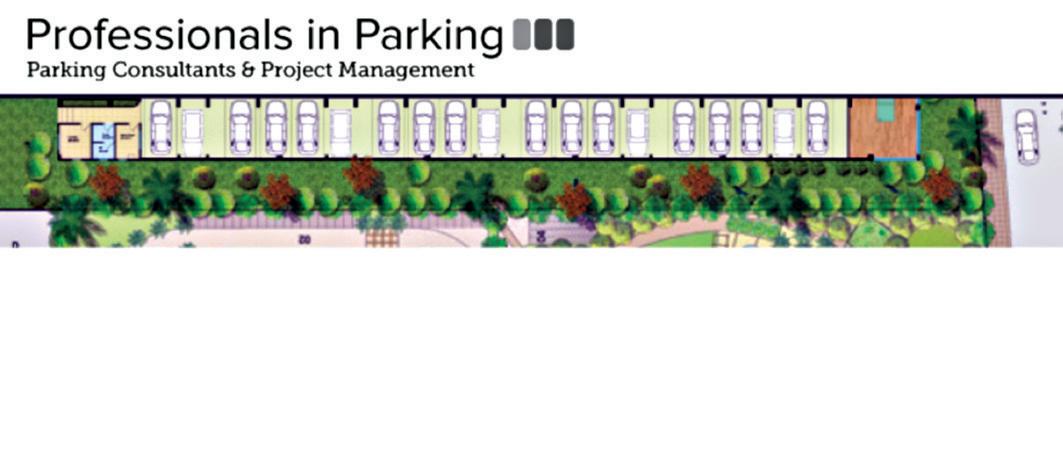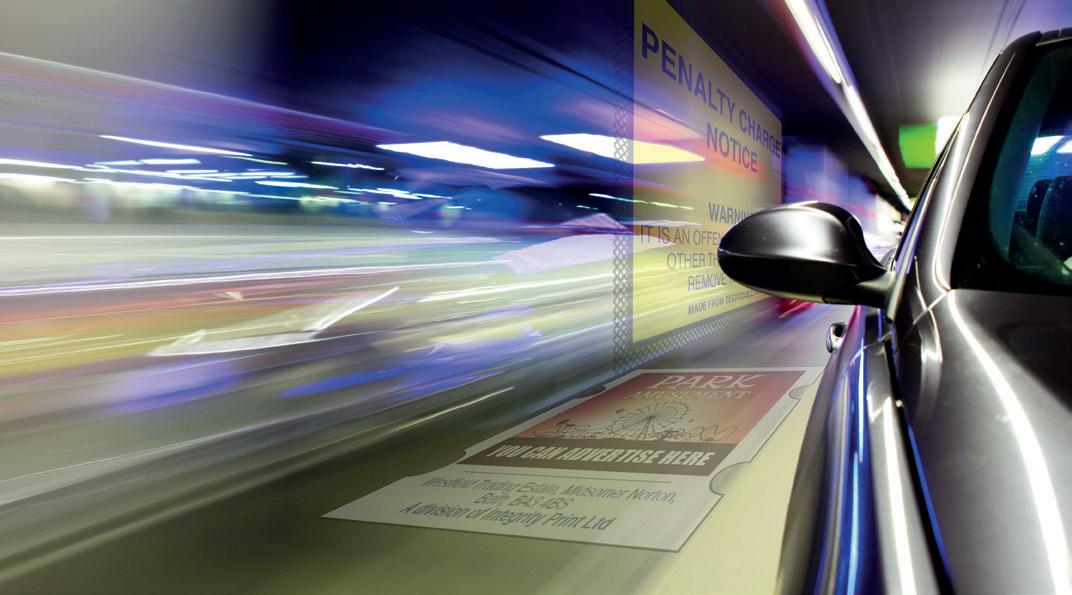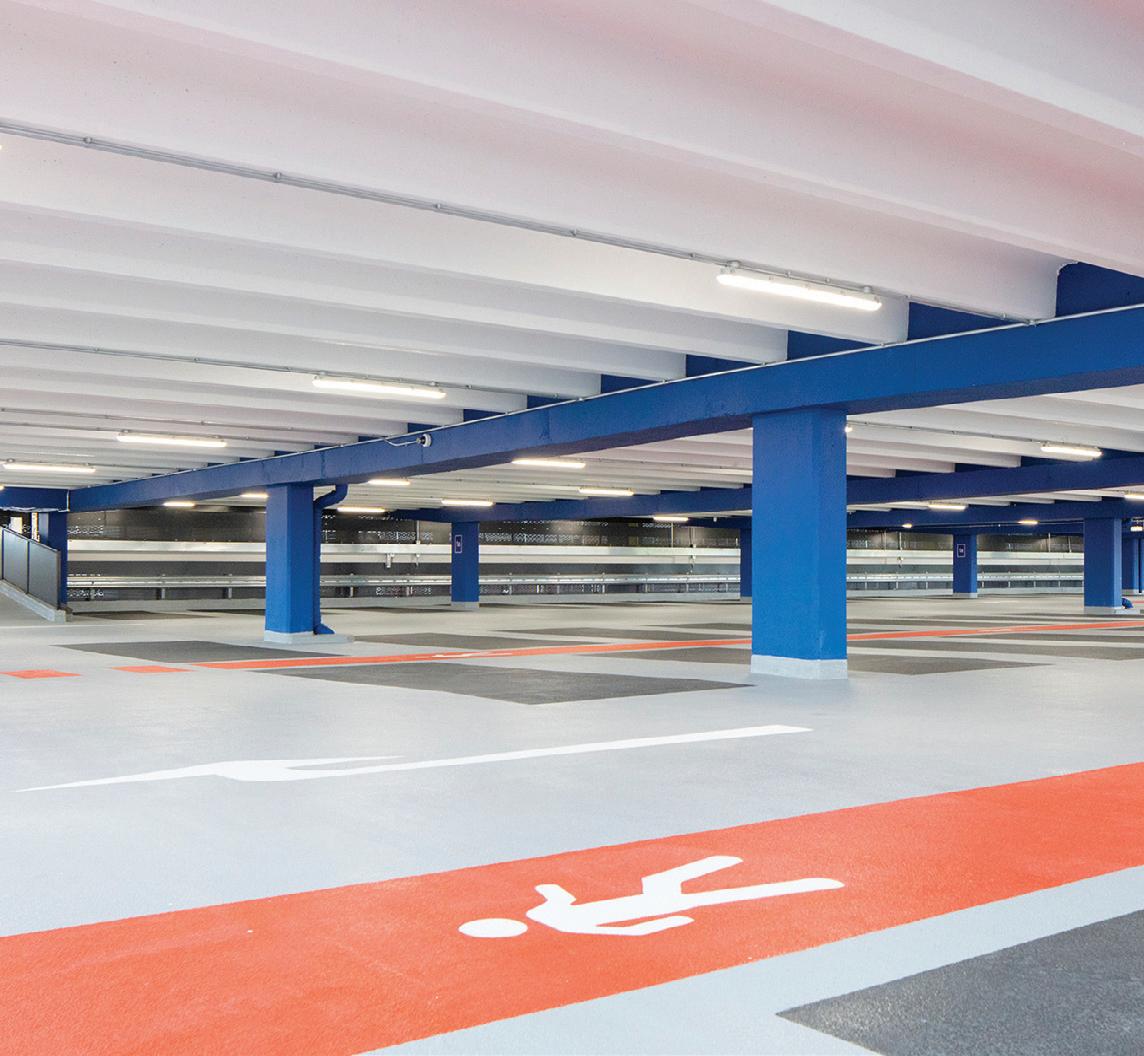

MARCH 2023 | #369


An informed debate around making car parks safer places will be part of Gabriel’s legacy



MARCH 2023 | #369


An informed debate around making car parks safer places will be part of Gabriel’s legacy
Gabe’s Law could be a testament to a young boy’s too short life

The tousle-haired boy smiles broadly as he poses for a photo. He wears a tee-shirt bearing an iconic image of another son of Liverpool, John Lennon with his partner Yoko Ono. The boy is Gabriel Santer. He was just 15 when he died after falling from a multi-storey car park in Liverpool on 3 October 2020. The death of a child is always devastating. But the knowledge that a death could have been prevented sometimes inspires parents to find ways of ensuring others do not experience the same grief. This was the case with the parents of Stephen Lawrence, murdered by racist thugs, the mother of Ella Kissi-Debrah, a life shortened by poor air quality, and now the father of Gabriel.
Johnny Santer has been campaigning for a change in the law on car park safety. He has inspired Maria Eagle MP to present the Multi-Storey Car Parks (Safety) Bill to Parliament. ‘Gabe’s Law’ calls for an increase in the minimum required height of guard rails and the introduction of 24-hour staffing of multi-storeys. Maria Eagle has highlighted the lack of information on the extent of the problem of problem of people falling from car parks. This is where connecting an issue with the life of specific individual has an impact as it humanises the policy detail. So let’s pause a moment and look at the boy in the photograph.
Gabriel was a pupil of Calderstones School in Allerton. Teachers described him as “a well-loved and charismatic young person”. The affection with which he was held was evident in the impromptu shrines created by Gabe’s school mates and friends he had made skateboarding at Pier Head. Typed across one photo of Gabe was the message: “You are loved and are capable of spreading love.”
At the inquest into Gabe’s passing, the coroner Andre Rebello was inspired to make the following statement: “Gabriel’s life is as precious as any life that has ever lived. Gabriel shares the same humanity we all do, but the beauty of humanity is we have individuality, and Gabriel was a unique and individual person that will have made and will continue to make a mark on society in which he lived and on his family and friends, and life is so precious that though he died before 16 he will alter the course of history.”
An informed debate around how to make car parks safer places will be an important part of Gabriel’s legacy.
Mark Moran Editor

The Enforcement Summit 2023 will explore latest policy, legislative and operational developments in the field of traffic, parking, air quality and debt recovery regulation.
The event encompasses: local authority enforcement operations; management of parking on private land; and the collection of road traffic, parking and other debts.
Keynote speakers and expert panels will examine themes such as:
n Civil parking enforcement
n Moving traffic enforcement
n Clean air schemes
n Road user charging
n Tackling nuisance vehicles and persistent evaders
n Balancing education and enforcement to encourage compliance
n Intelligence-led enforcement and debt recovery
n The enforcement of anti-social behaviour (littering, flytipping, noise issues)
n The role of civil enforcement agents in multi-agency enforcement operations
n Managing appeals and representations
n Engaging with vulnerable debtors
n The role of civil enforcement agents in multi-agency enforcement operations
n Training civil enforcement agents and the back office
n The use of ANPR as an enforcement and detection tool
n The collection, management and use of data
n The regulation of parking and trespass on car parks and private land
The Enforcement Summit 2023 will be attended by:
n Local authority officers
n Parking operators
n Finance managers
n Councillors and stakeholders
n Parking operators and contractors
n IT system suppliers
n Legal service providers
n Personal protection and body-cam suppliers
n ANPR system specialists
n Consultants and academics
n Citizens and debt advisory services
PROGRAMME
The conference will feature expert presentations and topical debates. If you have an idea for a talk contact the event’s programmer Mark Moran, Editor, Parking Review
Email: mark.moran@landor.co.uk
The Enforcement Summit 2023 provides your company with the perfect opportunity to carefully target the marketing of your products and services to those within the smart city planning, active travel, intelligent mobility and parking sectors. To participate in this sector-defining event contact Jason Conboy

Tel: 020 7091 7895 Email: jason@landor.co.uk
www.enforcementsummit.co.uk


22
BW Legal

Krishnarao sets out
time and costs parking operators face when seeking redress in court


Gemini Parking Solution’s Alastair Finlayson offers five bright ideas to help achieve a sustainable future in parking
Gavin Reddin feels inspired after attending the COP15 biodiversity conference in Montreal

Growth in moving traffic regulations, School Streets and LTNs drive PCNs past 7.4m mark, reports London Councils
Reducing the dominance of the car on the school run was debated at a Landor LINKS event hosted by Lambeth Council

The Twentieth Century Society is calling for a pioneering 1950s car park to be saved and reinvented for the electric vehicle era

A look at how the Safer Parking Scheme enables operators to audit the way they design and manage their facilities
The latest developments in electric vehicle infrastructure
Maria Eagle MP proposes law to prevent deaths by falling from car parks, reports Mark
 Moran
Moran
New legislation calling for reforms to prevent falls from car parks has been proposed in Parliament.
The Multi-Storey Car Parks (Safety) Bill proposed by Maria Eagle MP under the Ten Minute Rule would increase the minimum required height of guarding in new and existing multi-storey car parks as well as requiring 24-hour staffing of multi-storeys.
The MP has dubbed her proposed legislation ‘Gabe’s Law’ in memory of Gabriel Santer, a 15-year-old schoolboy who died after falling from the top of a multi-storey car park in Liverpool city centre in October 2020.

Eagle said her Bill would save lives and stop other families experiencing the pain that the Santer family is feeling. Introducing the proposed legislation on 28 February, the Labour MP for Garston and Halewood said: “Gabe’s father, my constituent Johnny Santer, is determined to ensure that Gabe’s death will not be in vain. He wants to make sure that no other person finds it so shockingly easily possible to fall or jump from an open-roofed multi-storey car park, and I want to help him achieve that aim.”
Eagle told the House of Commons: “After Gabriel’s father came to see me following Gabriel’s inquest, I was shocked to discover that the building regulations’ requirements for the height of barriers set a minimum height for guarding the rooftop of only 1.1 metres, or just around 3 feet. That is too low to stop anyone from accidentally falling, and it is certainly too low to stop anyone who is determined to jump.
“Multi-storey car parks must be attractive to those seeking to take their own life. They are easily accessible; one can reach the top floor easily, without needing to explain one’s presence; they are generally unstaffed, so there is unlikely to be anybody asking, ‘What’s going on?’; and the barriers only have to be 3 feet high to
meet the requirements set out in the building regulations. In addition, such low barriers make it easy to fall accidentally in certain circumstances.”
Eagle also said it is unclear how many people die after falling from car parks, but noted newspaper reports showed there were at least 17 deaths in England in a 12-month period during 2022.

Responding to the reading of the Bill, Johnny Santer said: “Gabe’s life was tragically cut short by a fall from an open roof multi-storey car park. Nothing will ever be the same again. I support this Bill because Gabe’s death could have been prevented. It’s clear these wholly inadequate current building regulations must be overhauled and I know that other families across the country will be impacted by this too. I implore the government to pass Gabe’s Law so that no other family, friend, or someone in the wider community is impacted by this again. If under current legislation car park owners will not use best practice voluntarily, then we have to enforce the law to do that for them.”
The Multi-Storey Car Parks (Safety) Bill is scheduled to receive a second reading on 17 March, but is unlikely to become law in its current form due to a lack of parliamentary time. However, the MP and the Santer family hope that the Bill will inspire central government, local authorities and the parking sector to make changes to how car parks are designed and operated.
An early indication that change could happen is has been seen in Gabriel’s home town. Liverpool City Council has voted to carry out local authority inspection of multi storey sites across the city.

The car park in Liverpool from which Gabriel Santer fell is operated by Q-Park. It has expressed sympathy with the grief of the Santer family and says it is sympathetic to the aims of its campaign to improve car park safety. However, the company says there a number of inaccuracies in the statements made by Maria Eagle MP. The operator said it would welcome a dialogue about car park safety via the British Parking Association (BPA), which has said it is willing to work with Maria Eagle on finding ways of reducing risks to people in car parks.
“The death of Gabriel Santer is a tragedy and we are deeply sorry for their loss and have expressed this to the Santer family directly. We take safety at our sites extremely seriously, which is why the Hanover Street car park outperformed required building regulations. Additionally, an independent panel has determined no wrongdoing on the part of Q-Park in these tragic circumstances.
“Whilst we are understanding and sympathetic with the motivations behind proposals for further safeguarding of high level structures, we regret that several inaccuracies are being put forward in Parliament about Q-Park that undermine these good intentions.
“The British Parking Association represents the industry and will, we are sure, welcome constructive and genuine dialogue with Parliamentarians and all interested parties.”
The British Parking Association says it is following the Multi-Storey Car Parks (Safety) Bill by Maria Eagle MP. The association has offered to work with the MP because it supports the essence of her Bill, known as ‘Gabe’s Law’.
The BPA said it is already actively working with government in the wider review of Building Regulations and has published advice and guidance to members on preventing falls from multi-storey parking facilities.
Kelvin Reynolds, BPA chief technical services and governance officer said, “We regularly engage with government about the building regulations associated with the design and building of car parks. All of Britain’s car parks are designed with safety of the users and their vehicles in mind.
“Occasionally, it’s not clear why people have fallen from a car park. Sadly, across the entire parking sector, suicides or attempted suicides arise from time-to-time. This is why we publish advice and guidance to our members on the risks and management of suicide in parking facilities. We will continue to do this in partnership with the authorities and agencies who have relevant expertise and experience.
“We agree everything that can reasonably be done to minimise the risks should be done and that is why are keen to work with Maria Eagle MP as she promotes her Bill.”
Councillors in Liverpool have voted in favour of the city council inspecting the safety of car parks in the wake of the death of teenager Gabriel Santer, who died after falling from the Q-Park on Hanover Street in 2020.
Gabriel’s father, Johnny Santer, believes future deaths could be prevented if there is a change both the way in which multi-storey car parks are designed and operated. His campaign has inspired Maria Eagle MP to introduce the Multi-Storey Car Parks (Safety) Bill to Parliament that would be known as ‘Gabe’s Law’ in memory of the 15-year-old.
Santer set out the ambitions for Gabe’s Law at a meeting of the full council on 25 January. His address was followed by a motion, submitted by Cllr Tom Cardwell, that asked the council to note Gabriel’s “tragic and avoidable death” and express its condolences to the Santer family.
The motion called on the council to request officers to undertake an inspection of all multi-storey car parks using existing statutory powers to assess the scale of any potential issues within the remit of Liverpool Council. The motion also notes that while the operator of the Hanover Street retrofitted the affected area of the car park with a much safer rail, it only covered the part of the facility where the tragedy happened.
The motion stated: “They (the operator) have to date failed to assist the Santer family in their understandable desire to answer as many questions as possible about events leading up to this tragic incident, choosing instead to appoint a major international law firm for the family to communicate with. This effectively ensures that not only are the Santer family’s questions unanswered but also the lessons we should learn from this tragedy remain unlearnt and the avoidable deaths of the future are not stopped.”
Cllr Cardwell said through the motion he hoped the council would also write to the Building Regulations Advisory Committee asking that they intervene with the operators of multi-storey car parks across the country to ensure that all the information available is shared to inform the work being done to change regulations and prevent avoidable deaths in future.
The councillors unanimously backed a call on the city mayor and cabinet to:
• Request officers undertake an inspection all multi-storey car parks using existing statutory powers to assess the scale of any potential issues within the remit of Liverpool City Council.
• Write a letter of support for the Ten Minute Rule Bill, Gabe’s Law, The Multi-Storey Car Park (Safety) Bill, being brought before Parliament by Maria Eagle MP.
• Write to Secretary of State Michael Gove asking that the government support the Gabe’s Law Bill.
• Write to the Building Regulations Advisory Committee asking that they intervene with the operators of multi-storey car parks in the UK to ensure that all the information available is shared to inform the work being done to change regulations and prevent avoidable deaths in future.
Drivers encouraged to make transition to cleaner vehicles before enforcement of LEZ introduced in 2024
Overall compliance with Edinburgh’s Low Emission Zone (LEZ) emissions standards has increased by more than 60% over the last six years, new data released by City of Edinburgh Council reveals. Over threequarters of vehicles are now compliant.
However, more than half of diesel cars and a third of light goods vehicles (such as transit vans) travelling on the main routes into Edinburgh do not currently comply with the requirements of the city’s Low Emission Zone (LEZ), according to the data analysed by the Scottish Environment Protection Agency (SEPA).
SEPA gathered information from temporarily monitoring automatic number plate recognition (ANPR) cameras placed on main roads leading into the city from the north, south, east and west. The data can be viewed on a publicly accessible tool, developed by SEPA, which compares data from 2016 to 2022.

A city centre LEZ was formally introduced in Edinburgh on 31 May 2022, along with LEZs in Glasgow, Aberdeen and Dundee. To help improve air quality and protect public health, Edinburgh’s LEZ will restrict the most polluting vehicles from the boundary, which will significantly reduce harmful traffic-related emissions of nitrogen oxides (NOx) by up to 50% in the zone. Further air quality improvements are expected across the wider city.
A two-year grace period is in place and no penalty charges will be issued during this time to help people and businesses adjust. From 1 June 2024, any vehicles that do not meet the minimum emission standards will be subject to penalties.

Cllr Scott Arthur, transport and environment convener, said: “Last year we joined cities across Scotland to introduce a city centre LEZ, which will play a central role in lowering harmful emissions in Edinburgh. We all have the right to breathe clean air and it’s our duty to do everything in our power to drive down air pollution and protect public health.
“Of course, these kinds of changes take some adjustment, and the two-year grace period is giving people time to prepare and make sure they avoid penalties once enforcement begins. It’s really encouraging that compliance is on the rise across all kinds of vehicles, with the LEZ helping to accelerate this positive transition towards cleaner vehicles.
“There’s still some way to go though, and I’d urge everyone travelling into Edinburgh to find out more about the LEZ, the support on offer and options for travelling more sustainably, choosing to walk, wheel, cycle or use public transport
SEPA’s analysis of the data from the Edinburgh LEZ found:
• Overall compliance with emissions standards for all vehicles over the last six years has increased from 48% to 78%.

• Lowest compliance is among diesel cars (50%), light goods vehicles (65%) and taxis (73%). The vehicles with highest compliance are buses (97%), petrol cars (95%) and heavy goods vehicles (86%).
• There have been significant improvements across different vehicle types over the last six years – compliance has increased for taxis from 21% to 73%, for buses from 24% to 97%, for LGVs from 7% to 66% and from 38% to 86%.
• The proportion of new cars registered that are diesel has fallen from almost 50% to 11% over the past 15 years. Around 55% of new cars registered are now petrol and 36% of new cars are electric or hybrid.
is the best way to help keep Edinburgh’s air clean.”
Dr Colin Gillespie, Air Modelling Unit manager at SEPA, said: “The development of LEZs across Scotland is built on science led by SEPA’s air quality modelling work. As part of the development of Edinburgh’s LEZ scheme, councillors used bespoke modelling tools to make informed decisions on the most appropriate way to achieve air quality improvements across the city. This latest data shows positive changes are being made, such as the increasing numbers of electric or hybrid vehicles being registered.
“Air pollution is one of the most important environmental health risks of our time, so the introduction of LEZs will aim to accel-
erate air quality improvements in the most polluted areas of our cities.”
LEZ restrictions will apply to motor vehicles, except motorcycles and mopeds. Vehicles must meet the minimum emissions standards to drive into the zone freely, though national exemptions will apply including for Blue Badge holders and emergency vehicles. Zero emission vehicles (electric) may enter the zone freely.
There is national grant funding available to help those who are most likely to find it difficult adjusting to the changes. Eligible small businesses, sole traders and households on low incomes within 20km (12 miles) of the zone can apply for grants from the Energy Saving Trust.
the police. In total, Home Office statistics revealed that 105,512 cars were stolen in 2021. Only 29,543 of these vehicles were ever recovered.
In recent years, car and parts theft has risen across the UK –with the recovery rate remaining very low. New research indicated that this problem is part of an international trend.
A European Union Serious Organised Crime Threat Assessment (SOCTA) report reveals there has been an expansion of organised car crime across Europe.
Published every four years, the report analyses car crime across the European Union. This edition still includes the UK despite Brexit.
SOCTA’s findings suggest that risk of serious and organised crime relating to motorists across the EU has never been higher. There are currently more than 5,000 organised crime groups that are under investigation.
The report found that criminal organisations have taken advantage of the situation due to
COVID-19 and the economic fallout in recent years.
According to the research, organised crime syndicates are run in a similar way to modern businesses, with management, operatives, and sales workers –drawing comparisons to high level international drug trafficking cartels. In some cases, cars are stolen to order, with inter-
national buyers making vehicle requests to criminal organisations who track them down based on their client’s brief.
The global automotive aftermarket for replacement parts and accessories is worth more than $390bn.
SOCTA found that in the UK, organised vehicle crime has emerged as a major problem for


Motorcycle theft is also prevalent in the UK with an estimated 25,212 stolen in 2022, and only 37% of them were found again by the police.
The SOCTA report looked into the impact of organised crime relating to vehicles across the continent. The research shows that Italy lost 166,075 vehicles last year; in France a total of 173,010 cars were stolen; and in Holland there were more than 85,700 incidents of vehicle theft in 2022.

Like the UK, EU nations had similar levels of recovery: around 25-30%.
By way of context, in the USA reports show that more than $4.5bn worth of car theft (parts and vehicles) happened in the first six months of 2022. The National Insurance Crime Bureau (NCIB) stated that more than half-a-million vehicles were stolen in that same time frame.
Over 5,000 criminal organisations are working across EuropeBASTION PUDILL/UNSPLASH Crime syndicates are run like businesses, with management, operatives and sales workers
APCOA Parking has opened its first UK ‘Urban Mobility Hub’ to the public at St Catherine’s Walk car park in the Welsh town of Carmarthen.
Mobility hubs are designed around a convenient central location, accessible to the public and able to offer a variety of accessible services all in one place. Hubs can also be used for local information and as a well-situated point to switch from one mode of transport to another.
By working with a network of partner organisations, APCOA has equipped the car park at St Catherine’s Walk to offer a range of services focussed on the needs
of the local community and visitors to Carmarthen.
The car park is operated using APCOA’s digital platform, Parkway, which links ANPR technology with multiple payment options to increase customer convenience.
The hub is fully Wi-Fi enabled and offers:
• 17 rapid and super-fast EV chargers
• five e-bike chargers with secure bike storage
• seating area with vending machines for hot and cold drinks and snacks

• three banks of delivery lockers covering every major courier
• a pre-bookable, heated, private office pod
• designated parking zones for Blue Badge holders, parents & child parking, and pre-bookable premium bays
• live transport screen showing real-time information on local bus and train services.
The chargers are a mix of units supplied by Tesla and Compleo Charging Solutions UK.
The hub was formally opened by the Mayor and Deputy Mayor of Carmarthen on 21 February,
facility with the aim of changing the battery on their electric bikes. They have access to a secure area where a large quantity of batteries are already charged, they take a fully charged battery, plug in the one they have used and then carry on by using the new battery. Pedivan said this process takes just a few minutes so there is little down time on their operation.
Courier opens third hub in a Q-Park car park
Pedivan Sustainable Delivery is opening a last-mile delivery hub at Q-Park Queensway in central London.

The cargo bike operator has established a network of microhubs across London, including ones at the Q-Park Pimlico and Q-Park Harley Street.
Pedivan delivery riders enter one of their hubs in a Q-Park
Adam Bodolai, chief executive of Pedivan, said: “We aim to create a step-change in the delivery activities by fully considering the last-mile logistical difficulties and ensuring a more efficient and greener last-mile delivery service.
“Q-Park has been the ideal partner for us to work with on our rapid growth. We look

alongside representatives from Transport for Wales and rail operator GWR as well as APCOA’s Urban Mobility Hub partners.
APCOA is now planning to open Urban Mobility Hubs at car parks in Manchester and Sheffield in the coming months with a roll out of 10 sites planned across the country. Each hub will feature services tailored to benefit the local communities and reflecting APCOA’s corporate commitment to sustainability.

Kim Challis, APCOA regional managing director UK and Ireland, said: “APCOA is proud to be at the forefront of the Urban Mobility Hub movement in the UK, designing spaces that bring convenience and sustainability together in one place and changing the future of car parks as we know them.”
forward to further expanding our operation with them in the future.”
John Denton, head of commercial at Q-Park UK, said: “We are delighted to further strengthen our partnership with Pedivan as they open their third last-mile delivery hub with us. ‘Sustainable Mobility Hubs’ are the future of parking.”
In addition to parking, Q-Park mobility hubs will provide access to shared mobility schemes, rapid electric fleet charging, last-mile delivery and retail space.
Q-Park is a pan-European business that has had a large presence in central London currently operates 18 parking facilities across the capital. These include locations such as Park Lane, Chinatown and Leicester Square. The company also operates in city centres across the UK.




















physical badges when parking on private land, such as supermarket car parks.
reports Deniz HuseyinTheft of Blue Badges would virtually be eradicated if the government made the nationwide scheme paperless, according to Seema Chandwani, Haringey’s cabinet member for tackling inequality and resident services.

Since Haringey launched virtual Blue Badges in the borough in November 2022, thefts have fallen by 65%. Between January and June 2021, Haringey police recorded a total of 528 crime reports relating to Blue Badges, including cars being broken into and the badge stolen. This fell to 185 for the same period in 2022, council data shows.
However, a further drop in thefts is unlikely unless a nationwide virtual badge scheme is introduced, believes Chandwani. “The paper Blue Badge system is counterintuitive. You’re told not to leave valuables in your car, and yet there’s a badge worth £1,000 on display in the window! The obvious thing to do to protect your badge is to keep it out of sight.”
Blue Badge holders who do not live in Haringey still have to display paper badges when parking in the borough. Chandwani told Parking Review: “The theft we’re seeing no longer tends to involve our residents. It’s people coming from outside the bor-
ough. And where our residents are having their Blue Badge stolen, it’s because they parked outside the borough and still had to display their physical badge. So, the big call here is: why can’t we do this nationally? Why can’t we have a virtual badge nationally?”
This would be a logical next step after the scrapping of paper Vehicle Excise Duty discs in 2014, since when police have used the DVLA’s electronic vehicle register and ANPR technology to check if a vehicle is taxed. Increasingly, civil enforcement officers are able to check Blue Badge data on their handhelds.
“The DVLA has been pushing for digital to become the default option for a number of years.
They were one of the first central government departments to make the tax disc digital. Since then, the government has talked about digitising services, yet this seems to be forgotten now.”
Chandwani pointed out that Blue Badge holders do not have to pay the Congestion Charge in London. “The data is all on TfL’s system – so ANPR can tell if you’re exempt or not.”
The technology is in place to do away with most paper Blue Badges, she argues. “I can get an Uber or pay for parking using RingGo or PayByPhone anywhere in the country, so why not use a disabled parking bay without displaying a badge?”
However, Blue Badge holders do still have to display their
A Disabled Citizens’ Inquiry has drawn up a set of solutions designed to make cycling and walking more inclusive. The solutions include a ban on pavement parking, improving walking and wheeling crossing points across roads and cycle paths and improving integration of walking and wheeling with public transport.
The inquiry is led by the charity Sustrans and the disabled-led group Transport for All, and is being funded the national disability charity Motability.
The inquiry held four two-day workshops with disabled people across the UK. Disabled people shared their experiences, explored barriers on the street locally, and worked together to suggest and design solutions for change.
The solutions were then tested and refined with practitioners from the transport sector and disability
organisations across the UK. Finally, the solutions that disabled people had developed were tested with the wider public through an independent representative survey of disabled people living across the UK.
The solutions include:
• prohibiting pavement parking to make communities more accessible
Having launched a virtual controlled parking zone (CPZ) permit in August 2022, it made sense to extend this to Blue Badges as well, says Chandwani.
The council does incur costs due to the administrative work required to transfer residents from a paper to a virtual system. However, these costs are offset by savings because fewer stolen badges need to be replaced.
So far, almost 2,500 Haringey residents have applied for virtual Blue Badges. This is out of a total of 4,000 Blue Badge holders in the borough that own their own cars, estimates Chandwani.
This should increase, with those who have had their physical badge stolen likely to switch to the virtual scheme, she predicts. Haringey is working with the police and the Neighbourhood Watch OWL (Online Watch Link) scheme to increase awareness of the virtual scheme.
The virtual Blue Badge scheme is evidence of a “changing relationship between residents and the parking sector”, believes Chandwani. “It’s about parking no longer being a silo event. If we see how badge theft is impacting on our residents, and if we are a council that really wants to serve our residents, then we need to bring in changes to help them rather than seeing this as a policing issue that doesn’t concern us.”
• creation of a long-term dedicated pavement fund to improve and maintain pavements
• ensuring disabled people can be within walking or wheeling distance of services and amenities by creating communities with accessible services close to where people live through better planning

• make wayfinding and journey planning tools work for disabled people.
The report states that disabled people have been largely overlooked in discussions about the 20-minute neighbourhood. It states: “Disabled participants told us they do not have the same choices. They may walk or wheel more slowly or not be able to walk or wheel as far as non-disabled people. Furthermore, many walking or wheeling routes and destinations are inaccessible making journey times longer. This needs to be better considered by transport and urban planners.”
Haringey councillor says virtual permits would eradicate theft.Cllr Seema Chandwani
An Open Market means multiple phone parking providers offer services in a single area. Which means more data, more innovation, and better service.
Motorists see improved experiences as mobility services become better connected
Councils save time and money on procurement while creating happier motorists
Suppliers innovate in a consumer-focussed market, led by healthy competition
See RingGo.co.uk/open-market














Worcester City Council is terminating its contract with Flowbird, provider of the payment machines in its 14 car parks.
The decision was taken by the council’s policy and resources committee following a review of arrangements, including two major issues at Flowbird payment machines in Worcester car parks. In September 2021 there was a delay of up to 49 days in customers’ payments by card being taken, while a year later in September 2022 numerous customers were charged multiple times for parking.
Last year’s problems resulted in almost £400,000 being taken in error from more than 15,000 sessions at the 14 council-owned car parks across the city. This meant more than 1,500 drivers were overcharged for parking with some seeing hundreds of pounds taken from their bank accounts after being charged multiple times.
In both cases the problems
were not caused by the city council, but by the payment machines and software supplied by Flowbird and the payment system operated by the company’s partner, Elavon.
Card payments at the city council’s 14 car parks have been suspended since September 2022, in order to avoid any risk of these issues reoccurring.
Council joint leader Cllr Chris
Mitchell said: “I think most Worcester residents will understand why we have had to take this decision. Thousands of people were affected by these payment problems, with the most recent situation in September 2022 seeing £390,000 in incorrect payments being taken.
“All the multiple payments were eventually refunded, but it has damaged the reputation of
Private parking is set to become a billion-pound a year industry as the number of tickets issued by firms hits an all-time high, says the RAC Foundation.
Data from the DVLA suggests drivers are set to receive more than 11 million penalties in private car parks over the current financial year, 2022-23.
In the first-three quarters of the year, some 8,564,762 vehicle keeper records have been bought by the companies from the DVLA.
The RAC Foundation regards this figure as a proxy for the number of tickets issued.
Some 181 parking management businesses have so far requested vehicle keeper records from the DVLA in 202223, paying £2.50 a time. ParkingEye was the most active, buying 1.1 million records.
Access to DVLA records allow the firms to track down vehicle keepers for alleged parking infringements on private land.
Each parking charge notice (PCN) can be for up to £100.

The RAC Foundation says this suggesting more than £1bn will be sought from drivers this year.
Between July and December 2022, parking firms issued around 5.64 million tickets, a 24% rise on the 4,554,378 issued in the same period in 2021. This is an average of roughly 31,000 every day.
Besides PCN payments, parking firms often receive management fees from landowners such as supermarkets, shopping centres and leisure facilities, to look after their car parks for them.
Changes to the way in which parking on private land is regulated are being made under powers granted via the
Parking (Code of Practice) Act which became law in March 2019.
However, in July 2022, the government withdrew the long gestating code of practice for the private parking sector. It is not yet clear when the code –plus an independent appeals service and a scrutiny board –will be introduced.
Steve Gooding, director of the RAC Foundation, said: “If only the rest of the economy was booming like the private parking sector, perhaps we’d all be feeling more prosperous.
“Private parking looks set to be a billion pound-a-year business, if it isn’t already, with demands for up to £100 a time being sent out to drivers at the rate of more than one every three seconds.
“There’s widespread agreement that the government should be setting up a regulatory framework for the industry, but it is nearly four years since the relevant law was passed. These numbers surely suggest that what’s needed now is action.”
our car park operation.
“People who live, visit and work in Worcester need to know that they can confidently use our car parks, so it is vital that the council acts in order to restore that trust.”

Cllr Mitchell continued: “The city council’s reputation, as a consequence of Flowbird’s failure, has been damaged and that’s just not acceptable to us. We pay them to deliver a service and they have failed to deliver that service.
“It’s extremely disappointing. Having had the first issue in 2021, we were given assurances that the problem had been resolved, it would not reoccur and we were good to go, and we took them on that value having had disruption two years ago and then for a similar thing to happen within 12 months meant we just completely lost confidence in them to deliver.”
The council has now appointed Metric to supply new payment machines for its car parks. These are expected to be installed in the next few months, bringing with them the reintroduction of card payments.
Freight sector business group Logistics UK has called for improved parking facilities for HGV drivers.
Speaking at a Transport Focus event held at the Hollies Truckstop in Cannock, David Wells, chief executive of Logistics UK, highlighted the issues HGV drivers currently face regarding roadside facilities and the need for drastic improvement.
Wells said: “I am thrilled to have joined other industry leaders in coming together help to raise awareness of this pressing issue. HGV drivers are crucial for keeping the country moving and ensuring our supply chains remain protected, yet they face a significant lack of hygiene and rest facilities compared with other industries. Government has long been promising solutions and now is the time to deliver.”
Logistics UK is a business group representing business involved in the making, selling and moving of goods.

A new management team has been appointed to lead payment technology company Flowbird’s UK parking business.
Danny Hassett, managing director of Flowbird UK parking services, will remain in the top leadership team and is joined by two new appointments.
Harrison Woods moves from his previous position of chief executive and co-founder of YourParkingSpace, the parking technology business acquired by Flowbird in July 2022.

Harrison Woods has been given the remit of leading the digital transformation of Flowbird parking services.
Flowbird Parking UK is seeking to grow ambitions through enhancing and launching digital solutions for both public sector and private parking operators.
Woods will also be joining the executive committee of Flowbird Group, whose head offices are
Smart Transport Hub has appointed Ayanda Collins as its operations director. She joins the consultancy from Islington Council in north London where she worked on cycling and walking projects for over five years.

While working at Islington she oversaw the delivery of the peoplefriendly streets programme including 35 School Streets, seven low traffic neighbourhoods and three pop-up cycleways.
At Smart Transport Hub Collins will look after the consultancy’s relationship with key clients, and represent its move to providing an end-to-end services.
in Paris, France.
Harrison Woods said: “I’m thrilled to be taking this position at Flowbird UK in a very exciting time for the company. Flowbird is the global leader for parking and urban mobility, operating in 4,350 cities, which is a fantastic base to develop new tech-
nologies and services for our clients. I’m very excited to begin working with Danny Hassett and the rest of the UK team to unify on-street and off-street in the parking market while collaborating with the global business units to deliver our vision for urban mobility on a global scale.”
Also making the move from YourParkingSpace is Chris Woods who becomes chief financial officer of Flowbird UK parking services.
Brannan Coady will replace Harrison Woods as chief executive of YourParkingSpace.
Frédéric Beylier, chief executive of Flowbird Group, said: “I’m delighted to have Harrison on board and working closely with Danny. We’re embarking on a crucial moment in Flowbird’s parking evolution to enhance our urban mobility digital solutions in this environmental transition period.
“Brannan and Chris are key leaders in the exceptional journey of YourParkingSpace in the UK and other geographies. To sustain and build on our position as the world leader in parking and urban mobility, a team with a proven track record of driving technological change is necessary.
“They bring the ambition and vision to drive our parking UK business position at the forefront of our global strategy.”
Property services company JLL has launched a dedicated car park solutions team to identify, unlock and enhance the value of car parks in towns and cities.
The multi-disciplinary team is led by Colin Chan, asset repositioning director. It has already entered into a strategic partnership with Town Centre Parking, a chartered surveyor specialising in parking and mobility, and CallisonRTKL, an architecture and design practice.

JLL believes a key catalyst for the focus on car parks will be structural changes related to a decline in car ownership and usage within the urban landscape over the coming decades, which will have a knock-on effect on demand for parking. The company says this shift means that suboptimal assets will be subject to higher risks of loss in income and capital value.
Research undertaken by JLL revealed there are over 23,000 car parks across the UK, 80% of these are surface car parks, many of which are currently being underutilised. The majority of these car parks are owned by the public sector, which is where lies the opportunity to unlock and enhance these assets.
Across the UK, JLL has advised on over 50 car parks located in prime town centres and at major transport hubs.
JLL has also been advising and repositioning car parks internationally. For example, at One Post Office Square in Boston, Massachusetts, USA, it advised on the transformation of an underutilised multi-storey car park that is set to deliver circa 80,000 square feet of prime office space within the central financial district.
The project will retain its car parking facilities, becoming Boston’s first automated car park, providing volume efficiencies by creating
maximum capacity within minimum space.
Colin Chan said the creation of the team represents a significant opportunity. “We have created Car Park Solutions to provide clients with a dedicated team to help them tap into the wider JLL network, so they have the right people and services at their disposal as the wider context around car parks rapidly changes,” he said.
“I believe car parks were part of the solution for our towns and cities across the UK in the last century. With a bit of work, they can be a big part of the solution for the next century in tackling social, economic, and environmental issues we face ahead of us.”
Alistair Meadows, head of life sciences and alternatives, Capital Markets EMEA at JLL, added: “The launch of our dedicated car park solutions team is an exciting chapter for JLL and our clients. Driven by our data and research, UK wide car park opportunities exist to be unlocked for repositioning and redevelopment. This opens up potential alternative, mixed uses including housing, urban logistics, life sciences, and selfstorage.”

Adam Dolphin has been confirmed as PayByPhone’s UK managing director, having been named interim managing director for the territory last September.
PayByPhone president and chief executive officer Jonny Combe said: “Adam is an incredibly talented commercial leader and very well-respected in the UK parking industry. He has built and led a robust team in the UK that has delivered fantastic success in a challenging market.”
Dolphin joined PayByPhone in 2019 as UK sales director after nine years with competitor RingGo.


Dolphin succeeds Anthony Cashel, who has taken on a global role at the Volkswagen owned cashless payment specialist.
Cashel has taken a senior role with the mobile parking pay-

ments provider, which is a wholly-owned subsidiary of Volkswagen Financial Services.
Cashel has joined the PayByPhone management board as chief client officer. He has been acting as interim chief client officer since September 2022.
In his new global role, Cashel will spearhead the development and implementation of PayByPhone’s strategy.
Cashel joined the company in 2017 and was previously
managing director of the UK business.
PayByPhone is run from Vancouver in Canada by Jonny Combe, who said: “Anthony’s strategic mindset coupled with his creative problem-solving make him a true asset to our management board. Anthony’s competence speaks for itself, and I have no doubt that he will continue to lead our teams successfully across different markets to deliver commercial success.”
Cashel’s new role is one of several changes to the management board. The recent departure of Lewisa Anciano, vice president global human resources, means Kristina Svab and Leyla Germain-Tardieu, directors of people and culture, will oversee PayByPhone North America and Europe respectively.
Both Svab and GermainTardieu will report directly to Combe, who will represent the HR function on the management board.
Ryan St Hilaire, vice president, product, also left PayByPhone on 31 January.
Tanya Reid has been promoted to senior director, product. Reid reports to Nigel Carroll, chief technology officer, who is the management board member accountable for product strategy and delivery.
Jonny Combe said: “I am immensely grateful to Lewisa and Ryan for always acting in the best interest of PayByPhone and for so robustly fulfilling their management board roles.”
We currently supply and have vacancies around the UK for Permanent and Temporary positions:

• Civil Enforcement Officers
• Environmental Enforcement Officers
• Parking Back Office (Appeals/Notice Processing/Correspondence)
• Parking Change Management
• Interim Parking Managers
• Car Park Attendants/Marshalls/Stewarding
• Parking Supervisors (Both Enforcement and Back Office)
• Parking Management (Both Enforcement and Back Office)
The British Parking Association (BPA) has recognised Anjna Patel for her advocacy of women in parking.
The Sandwell Metropolitan Borough Council officer was named an Inspirational Woman in Parking at the annual People in Parking Awards.
Returning for the third year, the People In Parking Awards invited inspirational stories of teams and individuals stepping up to take on new roles, learn new skills and support their communities.
The winners were revealed in an online ceremony on 23 January:
• Inspirational Woman in Parking: Anjna Patel MBE, principal manager,

Sandwell MBC and chair of BPA Board at the British Parking Association
• Outstanding Contribution Award: Barry Johnson, senior technical director, Taranto Systems
• Team Leader Award: Michelle Hempel, head of enforcement department, Total Parking Solutions
• Colleague Award: Tom Gallagher, parking and highway enforcement manager, London Borough of Lambeth
• Community Award: Ronald Teskowski, parking operative, UK Parking Control
• Long Service Award: Andrew Luck, transport manager, London Councils.
• Heads of Parking/Directors
• Parking Technologies (Business Development and Project Managers/ Field Service Engineers/General Managers)
• Off Street Parking (Business Development, Contract Managers and Regional Managers)
• CCTV Operators – SIA and BTEC qualified
Looking for staff or need employment?
Please contact our experienced team on:
Tel: 0203 668 5680
Email: parking@unity-recruitment.co.uk

Web: www.unity-recruitment.co.uk


The private parking sector has once again come under renewed pressure, more recently following a story in the Daily Mail which reports on large salaries being paid to owners and leaders of parking management companies.
The article, and other associated articles in other publications, fail to recognise that 39% of all parking charges are issued to people who have had three or more tickets, and that 99.77% of parking events result in a seamless journey. The constant negative rhetoric and misreporting is creating a hostile and challenging environment for operators, who offer a valued service to motorists and private landowners seeking to ensure such services remain viable.
Companies like Napier Parking are appointed by landowners to prevent abuse on private land, which includes motorists parking in resident bays, or parking on pathways which are meant for pedestrians.
The case of Napier Parking v Mr H is the tip of the iceberg in terms of the length some individuals (such as Mr H, who was not just avoiding the charges, but causing damage to property) are willing to go. Even though Napier was awarded costs in the instant proceedings, it was only a fraction of what they had incurred through the sheer amount of time they had spent in not only locating Mr H, but also BW Legal’s time and costs in preparing Napier’s evidence and legal arguments.
Whilst the government and trade associations such as the International Parking Community (IPC) and the British Parking Association (BPA) continue to negotiate a clear way forward for motorists and operators alike, recognition has to be given for the invaluable service this industry provides to the various stakeholders, such as the 99.77% of compliant users, residents, owners of retail parks and private landowners in general, and the fact that if parking sites are withdrawn, this will only add to the inflated costs being faced by all motorists.
Rohan Krishnarao is operational head of legal at BW Legal Services www.bwlegal.co.uk
Legal proceedings were brought by Napier Parking against ‘Mr H’ in respect of four unpaid parking charge notices (PCNs) for breaching the terms and conditions of parking at a residential site in London, which was managed and operated by Napier.

The offending vehicle continuously parked on a pathway which obstructed pedestrians and also caused a hazard. Mr H was also persistently misusing a loading bay.
Napier Parking was represented by its solicitors, BW Legal Services, and counsel at the final hearing.
In December 2019, Napier Parking was notified by one of its employees that someone had torn down a number of its signs at the residential site, where they had implemented a parking management scheme for the benefit of the residents.
The site in question was known as Colindale Gardens estate, located in London. Napier reported the fact that its signs were torn down to the estate manager, who was asked to help identify the individual responsible.
Upon receiving the CCTV footage and with the help of the estate manager, the individual was identified as Mr H who was, according to the estate manager, a resident tenant of Colindale Gardens.
In early 2020, it came to Napier’s attention that someone was repeatedly parking in breach of the terms and conditions of the site. A great number of parking charge notices (PCNs) were issued, but they were simply being ignored. In order to issue the PCNs, Napier made a request to the DVLA to provide details of the registered keeper of the vehicle, as the identity of the driver of the vehicle was unknown to them at the time.
When the DVLA returned the registered keeper information to Napier, it transpired that the vehicle was registered to a limited company that had been dissolved, however, one of the directors of the former business was in fact Mr H, being the same individual responsible for tearing down Napier’s signs.
With no prospect of recovering the unpaid charges from a dissolved company, Napier’s only option was to locate the driver of the vehicle.
Napier had instructed BW Legal to recover the unpaid PCNs and as part of the debt recovery process. BW Legal traced Mr H to an address where legal proceedings could be served.
Mr H was sent a number of pre-action correspondences at this address, but failed to respond or engage in the process. Ultimately, Napier was left with no option but to commence legal proceedings in the County Court against Mr H.
When proceedings were issued and served on Mr H, it finally prompted a response from him. Mr H filed a defence to the claim, denying all responsibility and also claimed that he had never lived at the flat address provided by the estate manager, nor did he receive any of the pre-action correspondence sent by BW Legal.
The court gave both parties directions to file and serve evidence and listed the matter for a full day hearing.
At the first hearing, the judge took into account submissions made by both Napier and Mr H, however, there was not sufficient time to deal with the matter in one day and therefore, the claim was part-heard and adjourned to a later date. This was also due to the fact that Mr H sought to raise new points of defence at the hearing, when he had previously failed to do so.
On 23 November 2022, the part-heard trial resumed before Deputy District Judge Helen Bell. The defendant attended in person.
Napier’s claim was successful. In her judgment, the judge found that it had indeed been Mr H who had been caught on CCTV damaging signs and also that he had lied about not receiving preaction correspondence at his address at Colindale Gardens.
On the basis of the findings of dishonesty, Napier were able to successfully argue that the defendant should pay costs on account of his unreasonable conduct.


The judge’s order was as follows:
• Judgement for claimant in respect of claims 35DP5W63 [‘claim 1’], claim H6DP754G [‘claim 2’] and claim H3DP356Y [‘claim 3’].
• The defendant is to pay the claimant damages and interest of £662.98, being the sum of £164.94 (claim 1), £164.06 (claim 2) and £333.98 (claim 3).
• The defendant is to pay the claimant’s costs, assessed as follows:
i. Issue fee £85 (claim 1 £25, claim 2 £25 and claim 3 £35)
ii. Application fees £550 (£275 x 2)
iii. Hearing fee £75;
iv. Legal representatives’ costs £150 (£50 x 3)
v. Witness expenses £95
vi. Further costs on account of unreasonable behaviour, pursuant to CPR r. 27.14(2)(g), summarily assessed in the sum of £3,500.
In total, the claimant’s is liable for £5,117.98 (made up of damages and interest of £662.98, and costs of £4,455.00).
Do you want to be part of the change?
Is your company ready to be seen as a changemaker?
Alastair Finlayson
There are fantastic technologies available which can be added to parking facilities to both promote and incentivise recycling. Your car park can now become a hub for sustainability with the addition of a ‘reverse vending machine’. Companies are now offering technology which allows customers to track the plastic that they recycle and even get rewarded for doing so.
Alastair Finlayson of Gemini Parking Solutions has five bright ideas for a sustainable future

Sustainability is a topic that is deep-rooted in modern society. It is the motive for significant acts of protest from many across the world, with radical protesters blocking roads and vandalising art in its name. But could they be onto something? Whilst we may not agree with the methods, the message behind these actions is undeniable. Our world has been greatly impacted by growing populations, development, and the resulting pollution, all hot topics for executives and consumers alike.
It is not all doom and gloom though. We may, in fact, be in a better position than ever to create a cleaner greener way to deliver our business and this change can happen from the car parks of businesses across the country.
The question is, do you want to be part of the change? Is your company ready to be seen as a changemaker?
Parking has experienced a great shift over the past two years, much of it spurred on by the changing demand of consumers. We are now, more than ever, living in a virtually cashless world. The parking industry has supported this transition, and with it comes many small but impactful changes to the way in which we deliver our service.
The move away from pay & display and ticketed enforcement has meant a reduction in paper wastage that is expansive.
With an estimated 8 million to 11 million parking spaces across the country, if every paid parking space switched to a digital only, paperless system, the paper saving alone would have a great impact.
The use of eco-friendly materials contributes significantly to green parking. Modern car parking facilities take sustainability seriously and are beginning to turn their car parks into carbon neutral hubs that give back to the urban landscape.
The inclusion of green roofs and eco-friendly solar powered lighting are just two examples of the many ways in which a structure can offer a greener solution for businesses and the environment.
There are also opportunities for tickets and parking charge notices (PCNs) to be issued in fully biodegradable bags which don’t harm the environment, something which has already been implemented by Gemini Parking Solutions.
The UK and Ireland have the highest potential in Europe for reforestation initiatives, which presents a great opportunity for businesses to get involved and give back by carbon offsetting on their customers’ behalf.
This does not need to end on a B2B basis, but customers buying permits could be rewarded for parking and car-pooling with an offset to their carbon footprint.
The Gemini Parking Solutions ‘Contract for Trees’ scheme was an impactful campaign for sustainability and is a best practice that we will continue to develop. For every new client signed with Gemini, we plant a tree and support the reforestation of the United Kingdom.
A clear benefit, and an undeniable one, is that parking facilities offer the opportunity for a less crowded city and urban area. When parking is considered at the early infrastructure planning phase of a city, we have seen how this creates more pedestrianisation and safer environments.
Active city links with well-established parking facilities means less cars, which means less congestion and, of course, less pollution.
The future of this positive environmental impact could lie within a parking space. The mobility hub concept means that car parks are now becoming more than a place to park your car, they could be where you hop onto your e-bike or scooter, link up with your sharing scheme to take you the final miles into the city, or where your local logistic company delivers to a locker – reducing the need for multiple delivery locations.
Businesses now understand that sustainability is not simply a PR exercise, or a logo that looks good on the company website but is a core building block of a successful business. With consumers, employees and governing bodies all having a keen eye that sees through false claims and disingenuous activities, taking sustainability seriously has never been more important.
Gemini Parking Solutions has helped deliver sustainable initiatives for clients across a wide range of sectors, from our Contract for Trees initiative to our electrification services, adding electric charging points to car parks, we are transforming how the parking industry delivers its services.
Alastair Finlayson is Gemini Parking Solutions’ general manager www.geminiparkingsolutions.com

It is easy to think of biodiversity as just nice to visit and look at, but without it our entire support system for human as well as animal life would collapse. We sometimes think we can lose part of it, but the interconnected nature of it means that the impact can be enormous. From mass extinctions of animal life to the destruction of the rain forests, the damage to biodiversity affects us all.
Often seen in the media as the little brother of the climate change conference, COP15 focussed on creating and monitoring attempts to end the catastrophic decline in biodiversity that has been occurring in recent years. Nature is critical to meeting the sustainable development goals of limiting global warming to 1.5 degrees.
COP15 is shorthand for the 15th meeting of the Conference of the Parties to the UN Convention on Biological Diversity (CBD), a twoweek summit that took place in Montreal, Canada, from 17-19 December 2022. I was very fortunate to be able to attend COP15 in Montreal after the conference was moved from China over COVID fears. It is not often that you get the chance to witness something historic and life changing but this event was certainly that.
Vast amounts of public money goes into projects and industries (like ours) that do immense damage to the environment. We need to ensure this changes and money is targeted at reducing and reversing this damage.
The parking and traffic management industries have an essential interest and role in this field as the transport sector accounts for 21% of the world carbon emissions and urbanisation in which cars play a huge role account for much of the loss of 420 million hectares of forest since 1990. In addition, cars contribute with other forms of transport to pollution that causes 1.8 billion excess deaths and causes 2 million children to develop asthma.
Few now doubt either the extent of the challenges facing us in terms of climate and biodiversity disaster or our own individual responsibility to act both individually and collectively.
For us working in the parking sector it means, simply, the need for less and less polluting cars, lorries and coaches. It means coming up with the technologies to improve the use of electric vehicles and make them the sensible choice for all.
It means innovating around emissions charging, congestion charging, road charging, reducing speed limits and creating shareduse spaces that de-prioritise the use of cars.
It means helping achieve the goal of creating smart cities with transport hubs that rationalise and reduce the number of vehicles and ensure those that exist are carbon neutral.
It means taking a stand against road building and innovating and creating digital technologies that reduce emissions.
It means contributing to and investing in projects that enhance biodiversity and that make the environment better for all and not just the road user.
Innovations aimed at mitigating the impact our industry include the launch of an electric charging corridor for trucks in Europe, the creation of an active travel corridor in Edinburgh and other initiatives. It also means, however, recognising the problems that we have created and stopping the incessant chatter of ‘green washing’ where we seek to label our products as environmentallyfriendly when they clearly are not.
The key outcomes at COP15 were twofold. Firstly, the setting of internationally recognised targets in 23 different areas, the headline, to protect 30% of the earth’s land, oceans, coastal areas and inland water by 2030. Secondly, as proposed at the climate conference, to have a fund for poorer nations to tackle the problems in their country. In essence, an admission by the developed world that we bear the lion’s share of the responsibility for the state we are in and will have to contribute more to ameliorate it.
Watching the conference in action was fascinating, as 10,000 people from around the world representing 192 countries negotiated, cajoled, and went to the wire in finding an agreement that can help the situation as well as having a realistic chance of being implemented. It was humbling to watch the effort and though I left the conference more aware and more troubled by the state of biodiversity and the part our industry plays in it, I was conversely enthused and optimistic that maybe we had a chance, and even if not, it was our duty to the planet our children will inhabit to try our very best.
Gavin Reddin is managing director of Parking and Secure Documents www.parkingandsecuredocuments.comregulations, School Streets and LTNs drive PCNs past 7.4m mark, reports London Councils
Over 7.4 million penalty charge notices (PCNs) were issued by London’s boroughs and Transport for London for parking and moving traffic offences in 2020-21, newly released figures reveal. London Councils has published data on parking enforcement and appeals in London for the 2021-22 financial year, ending on 31 March 2022.

The figures show that the London boroughs, London Lorry Control Scheme and Transport for London issued a total of 7,472,886 PCNs to motorists who they believed had contravened parking, bus lane and moving traffic regulations.
This represents an increase in PCNs issued of 41.3% from 2020-21, as traffic flows and parking demand increased after the pandemic, and enforcement authorities in London recommenced their enforcement operations in all areas.
London Councils state: “It should be noted that due to reduced enforcement activity during the height of the pandemic in 202021, figures are not overly representative. With respect to pre-pandemic figures (from 2019-20), this shows an overall increase of 21.4% of PCNs issued.
“This was largely due to an increase in the number of moving traffic contravention (MTC) PCNs issued of 55.42%. The main
reason for this has been the introduction of the new low traffic neighbourhoods (LTNs) and School Streets. These came into force to manage traffic flows and encourage social distancing during the pandemic, whilst also improving road safety and air quality, especially around schools for the protection of school pupils and residents within the locality.
“Parking and traffic management provide important benefits for pedestrians, cyclists, motorists, and communities throughout London. These include maintaining road safety and access for Londoners to employment, goods, and services.
“Traffic rules and regulations also play a critical part in reducing congestion and helping to make London’s streets safer for everyone. Whilst it is a small minority of drivers who fail to follow the rules of the road, enforcement is necessary to encourage all drivers to drive and park in a considerate and safe manner.”
If drivers believe they have received a PCN in error, they can appeal to the authority that issued the penalty. If they are not satisfied with the outcome of that appeal, drivers can then appeal to an independent adjudicator via the relevant independent appeals service at London Tribunals.
The number of all appeals received by London Tribunals in 2021-22 has increased by 37.4% from 2020-21 levels. London Councils said this is largely due to the increase of 54.7% of MTC appeals and the increased levels of enforcement due to low traffic neighbourhoods and School Streets, as well as a general indication of increased traffic flow back to pre-pandemic levels. The numbers of parking and bus lane appeals are down from pre-pandemic levels.
London Councils said: “Statistics indicate that the total percentage number of appeals allowed is down from the previous year to 42.8%. This is an historically low level and reflects efficient practices by authorities in considering representations more effectively before cases proceed to appeal, and improved enforcement operations.”


The number of MTC appeals allowed is also down to 38.3%, despite the large number of PCNs being issued and appeals lodged. London Councils said: “This indicates that in the main, authorities implementing new restrictions have done so correctly, ensuring that signs are in place and utilising CCTV and ANPR evidence in the manner intended to capture contraventions.”
All income from PCNs is put towards paying for the provision of essential traffic and parking services. Any surplus is invested in other important transport projects, such as the Freedom Pass concessionary travel scheme for older and disabled Londoners


School Streets 2023 shared best practice on transforming the school run
School Streets offer a way of reducing the dominance of the car as the means by which children travel to and from school, making space for families to explore options such as walking, cycling and public transport.
A School Street is a road with a temporary restriction on motorised traffic during school drop-off and pick-up times. The restriction applies to both school traffic and through-traffic. Schemes will enable only residents and essential service vehicles to enter and leave the streets covered, with permit schemes sometimes enforced by patrol officers or cameras.
Over 200 people attended the inaugural School Streets conference, organised by Landor LINKS and hosted by Lambeth Council on 21 February.
The event at Brixton Town Hall saw councillors, local authority officers, campaigners, consultants and specialist contractors share their experiences of setting up and running School Streets.


The day’s presentations can be downloaded on the official website.
www.landorlinks.uk/school-streets
The School Streets conference explored the policy and practical aspects of encouraging walking and cycling
Lambeth Council’s Cllr Rezina Chowdhury, cabinet member for sustainable Lambeth and clean air, opened the School Streets 2023 conference.
Looking back at the day, Cllr Chowdhury said: “I was delighted to open the inaugural School Streets conference which brought together professionals from a range of disciplines, showcasing best practice and offering practical guidance through excellent and thoroughly engaging panel discussions and workshops.

“During the first session we looked at the challenges presented on the ground when implementing School Streets. We know they effectively address the congestion, road safety and air quality concerns that many schools experience. Monitoring of schemes has revealed how they are enabling children and families to safely walk, wheel, scoot or cycle to school. And by making active travel possible for everyone, they help contribute to efforts to tackle the health crisis and climate change.
“As awareness of new schemes grows, the case for School Streets becomes ever more compelling. Not only do they improve the quality of people’s lives locally – they make a difference for entire communities. But the success of a scheme depends on how consultation, implementation, enforcement, and monitoring are conducted.”
The opening session was chaired by Lucy Marstrand-Taussig, policy lead at Transport for London. She said: “The huge appetite for creating more School Streets came through loud and clear from the speakers and delegates in the session I chaired.


“It wasn’t just the fact the event was sold out – and great to do an event in person – but so many delegates from across the UK are saying they want streets which children can safely use to get to school independently.
“They are seeking ways to cut air pollution and road risk, using planters, bollards or camera enforcement. In isolation, School Streets don’t solve these problems – you need a wider plan for the school catchment, especially for secondary schools – but they are part of the solution.”
Top tips on consultation, design and implementation of new schemes
Panellists
• Lucy Marstrand-Taussig, design policy lead for streets, Transport for London (chair)
• Jenny Babey, project manager behaviour change and engagement, Sustrans
• Suzy Harrison, active travel manager, London Borough of Lambeth
• Kate Jack, smart mobility lead, Stantec
• Habib Khan, founder and director, Meristem Design
Running and enforcing School Streets. Getting the right balance between cameras and softer measures to bring about behaviour change
Panellists
• Keith Hanshaw, client services director, Marston Holdings (chair)
• Idowu Ereoah, traffic enforcement manager, London Borough of Haringey
• Andrea Jones, director of strategic accounts, Marston Holdings
• Adi Roser, senior sustainable transport planner, London Borough of Hackney


How effective are School Streets at encouraging active travel, and improving road safety and air quality? And do they really improve people's quality of life?

Panellists

• Tanya Braun, director of policy and communication, Living Streets (chair)
• Nicola Mastini, principal consultant, Smart Transport Hub
• Claire McDonald, school lead, Mums for Lungs
• Mahalia Sterling, principal city planner, Transport for London

• Asa Thomas, researching doctorate on School Streets, University of Westminster

How strong leadership and a clear narrative can build firm foundations for new schemes
Panellists
• Glenn Higgs, technical director, WSP (chair)
• Mete Coban, cabinet member for environment and transport, London Borough of Hackney
• Louise Krupski, cabinet member for environment and climate action, London Borough of Lewisham
• Catherine Rose, cabinet member for leisure, parks, streets and clean air, London Borough of Southwark
The implementation of School Streets can help win public support for wider neighbourhood traffic management measures, a panel of local authority cabinet members told the conference. School Streets involve traffic controls during children’s arrival and departure times – normally one hour in the morning and an hour in the afternoon. During the event, hosted by Lambeth Council and organised by Landor LINKS, the consensus appeared to be that the most effective way of managing School Street schemes was by deploying camera enforcement rather than closing the roads using temporary barriers.
The day concluded with a panel discussion with senior London council councillors who are School Street champions: Hackney’s Mete Coban, Lewisham’s Louse Krupski and Southwark’s Catherine Rose. Mete Coban, Hackney’s cabinet member for energy, waste, transport and public realm, announced at the event that the borough now has 50 School Streets, more than any local authority in the UK. He said that School Streets should be seen as one of a “package of interventions” that include low traffic neighbourhoods (LTNs), 20mph limits and bus travel.
Coban said that after he retained his seat in the local elections in May 2022, it might have been easier for him to avoid contentious schemes such as LTNs. He said: “Yes, I could have just kicked the can down the road and kept things ticking over, but ultimately we are here to do the right thing for our communities.”
Traffic management schemes are interconnected as they all improve road safety and air quality, are good for community cohesion and encourage people to walk and cycle, said Coban.

Louise Krupski, Lewisham’s cabinet member for environment and climate action, said no traffic management schemes should be viewed in isolation.
She said: “We’re putting in a sustainable streets programme at the moment, which is out to consultation, and we’ve tried to make it more about improving people's streets and electric vehicle charging points, and looking at all the junctions and sight lines, and making streets more safe for people.”
But Krupksi admitted that the council is in the midst of a “massive battle” with some residents. Any traffic management measures would be very difficult without the “base line” of controlled parking zones, she pointed out. “We’re trying to get the basics right, so that we can then build on top of that with further sustainable transport policy.”
Play Streets, where a residential street is closed to through-traffic once or twice a month, serve as good starting point for other schemes, said Krupski. “The point about Play Streets is that they create a culture of demand. This makes further intervention easier over time because people can see examples of how these things work. Play Streets are a way of showing how School Streets will work in practice. Encourage your councillors to get Play Streets up and running. And believe me, you can put in a Play Street pretty much anywhere, including on bus routes.”
Catherine Rose, Southwark’s cabinet member for leisure, parks, streets and clean air, said it is important to use data to show the problems that existed before School Streets were introduced.
“We need to highlight the health inequalities and the accident collision data,” she said. “Political will and strong leadership are really important – it enables what we know the majority of residents want to achieve, and School Streets are really powerful in shifting the status quo. It is a child’s fundamental right to arrive at school safely and we shouldn’t countenance the idea that any inconvenience to drivers should prevent us from doing that.”
Council officers should clearly set out the many benefits of School Streets and draw up bullet points that can be shared with councillors, said Rose. “It’s really important to get the evidence out there and to celebrate the wins.”

The Rupert Street car park in Bristol should be saved from demolition, says the Twentieth Century Society (C20). The charity has submitted an application to list the city centre car park as a pioneering example of 1950s multi-storey design and the first car park in the UK to feature a continuous spiral ramp.

Rupert Street was built by the Multidek Development Group between December 1959 and October 1960 to designs by the architect R Jelinek-Karl and engineers GC Mander & Partners.
The C20 Society says: “Rupert Street is a bold and sculptural building, this is a superb example of 1960s Brutalism that clearly expresses its function and structure, while being a true innovation in the field of car park design.”
There are just three listed post-1945 car parks in England: Coventry Retail Market, Preston Bus Station and the former Cole Brothers’ department store in Sheffield.
Located close to the proposed inner ring road at Lewins Mead in the heart of the city’s rebuilt shopping and commercial centre, the 35,000 square foot (3,000 square metres) Rupert Street site accommodates six decks of parking for around 550 cars.
Elliptical in plan and based on axis of 20 feet and 129 feet, the levels are linked by a continuous half-a-mile long ramp that spirals
around a central lift and staircase block. The ramp rises at a relatively slight gradient of 1 in 32 on the straight and 1 in 60 on the outer curve, with a rise of 5 foot over the length of one floor – or one half-circuit. At 56 foot wide, it provides a central carriageway of 24 foot which can accommodate twoway traffic and allows for 16x6 foot parking spaces either side.
Property firm Student Roost wants to demolish the car park in order to make way for a 21-storey student accommodation block on the site. If built, it would be the second tallest structure in the city, incorporating ground floor retail and 450 car parking spaces – 100 fewer than is provided by the existing Rupert Street car park. A planning application is expected in spring 2023.
The C20 Society says the demolition of the concrete structure would have a significant carbon cost.
Open source data on parking provision in the city indicates that there is still high demand for public car parking in Bristol.
Excluding the reservation-only parking at Cabot Circus shopping complex, the NCP operated Rupert Street car park provides nearly 10% of all car parking spaces in the Central and Broadmead areas of Bristol.
The city council recently increased charges at its car parks and on-street bays in and around the city centre, as part of a sustained bid to persuade more people to ditch their cars and switch to more sustainable modes of transport, such as walking, cycling, public transport and park & ride. The Bristol clean air zone also came into force in 2022, as part of the council’s efforts to meet the legal limits for traffic produced air pollution.
The C20 Society says such policy initiatives are to be welcomed. It believes the Rupert Street car park represents an opportunity to adapt to the changing demands of vehicles in cities: repurposing an historic example of automobile architecture as a dedicated storage and charging hub for electric and super low-emission vehicles.
Bristol aims to achieve 100% ultra low emission vehicle (ULEV) coverage by 2050. According to a 2019 report by the Schumacher Institute, this would require between 6,000 and 23,000 chargepoints –the city currently has just 81. The report concedes: “Bristol’s streets do not tend to support public parking, or at least they were not built for it.” One solution, seen in the likes of Oslo, San Francisco and Amsterdam, would be “the introduction of exclusive electric car parking lots in desirable city centre locations”.
Durham County Council has unveiled the design of a new bus station and car park. The proposed bus station and a 120space surface car park would be built on the existing bus station site in Bishop Auckland town centre.

The project will be built using an £11m grant from the government’s Future High Streets Fund on a site behind the Newgate shopping centre, which the local authority bought in 2022.
Cllr Elizabeth Scott, cabinet member for economy and partnerships, said: “Plans to improve sustainable transport and parking in Bishop Auckland are key aspects of our ambitious proposals to regenerate the town.
“We are committed to ensuring it becomes a thriving and attractive hub to everyone who lives and works in, and visits, the area.
“To make sure our plans work for residents, shoppers and businesses, we would encourage as many people as possible to have their say on this consultation. Their feedback can help to bring about positive changes in this
community and we want everyone to be part of this exciting journey.”
Plans for the bus station include eight bus stands, improved passenger information boards and seating areas, as well as three entrances and exits and a kiosk area. It would also see improved facilities for passengers, such as an accessible toilet, parent and child facilities and a Changing Places toilet.
The council hopes the new bus station will offering better quality public transport to residents and visitors with the aim of attracting more people into the town centre.
As visitor numbers to Bishop Auckland are expected to significantly increase through a series of regeneration projects, more car parking provision is also required to meet the needs of those visiting the town.
It is proposed that sustainable drainage planters and a water harvesting system will be installed alongside the use of photovoltaic panels to produce energy.
Meanwhile, a new surface level car park that will offer 120 spaces, including electric vehicle charging point bays and spaces for blue badge holders, wheelchair accessible vehicles

New payment machines have been installed and lighting upgraded in several Torbay multi-storey car parks in a £1m upgrade programme.
Work got underway in early 2022 with the installation of new ticket machines that offer more flexible payment options to customers and upgrades to lighting at several sites.
Other enhancement works are either completed, underway or are due to get underway and include:
• improved lighting at the Terrace, Victoria, and Beacon Quay car parks
• redecoration of stairwells and lift lobbies at Lower Union Lane, Union Square, Victoria and, Roundham
• re-lining at Broadsands, Breakwater, Youngs Park, Princess Street, Great Western and Station Lane
• extra security gates at Victoria multi-storey car park
• new handrails at Meadfoot Road car park.
Throughout 2023, the refreshing of lines in multistorey and surface level car parks with further lighting improvements, new signage, as well as replacing handrails and vehicle and pedestrian barriers is also due to take place at other parking locations across Torbay.
The Lower Union Lane and Union Square car parks in Torquay are also benefitting from improvements using funding secured through the Safer Streets Funding. These include brand new fire doors on all levels, enhanced security around windows and the installation of motion-activated voice systems on upper levels.
A CCTV camera has been installed in Lower Union Lane,
and motorcycles is proposed.
Cllr Scott said: “As well as improved connectivity to the town centre and Newgate Centre, trees and planters will be placed throughout the car park to create a more welcoming and sustainable environment. We are also exploring opportunities to make the existing Newgate Centre car park more user-friendly.”
It is envisaged that the car park will help to reduce pressure on residential areas when visitor numbers increase for cultural events such as the food festival, Kynren, and other local attractions.
with more cameras due to be installed in Lower Union Lane car park in the next financial year.
Cllr Mike Morey, cabinet member of infrastructure, environment and culture for Torbay Council, said: The much-needed programme of works has been developed in line with the recommendations from the structural condition surveys which were undertaken in 2022. Years of under investment in Torbay’s car parks left a significant backlog of maintenance and repair issues that our partnership administration is addressing.”
The council has appointed TDA Group to project manage the works. TDA Group, created by Torbay Council in 2011, is a collection of companies offering a range of diversified services spanning business and property services, workspace management and affordable housing.
South Warwickshire University NHS Foundation Trust has achieved Park Mark Plus status.
Environmental sustainability is a key focus of the Park Mark Plus. The assessment included the availability of electric charging bays, of which the car park currently has 12, and energy-saving equipment. The car park provides motorcycle parking with helmet lockers and a bug hotel.
Sean Mitchell, security and parking services manager, said:
“When building the MSCP we strived to build a car park that was of the highest quality. It is a real honour to achieve this prestigious award and for our trust’s dedication to provide safe and secure parking for staff to be recognised in this way.”
BPA area manager Matthew Robinson said: “I am delighted that South Warwickshire Hospital MSCP has achieved the Park Mark Plus award, demonstrating their hard work and commitment to provide a safe environment for users.”
To achieve a Park Mark a car park has to achieve standards set out by the police. The Safer Parking Scheme sees facilities undergo a risk assessment that covers the management and maintenance of a facility, ensuring that there are appropriate levels of surveillance, lighting, signage and cleanliness. Car parks that pass the assessment can use signage featuring the Park Mark tick, so that drivers know exactly where to go for safer parking. Currently, 5,000 car parks have the Park Mark award.Car park in the Safer Parking Scheme are reassessed on a regular basis to ensure that standards are maintained.
The Park Mark was created by Police Crime Prevention Initiatives (CPI) as a way of reducing crime and the fear of crime. The scheme is administered by the British Parking Association (BPA), which operates a network of regional managers who liaise with parking operators and local police forces. The scheme is run by the BPA in parallel to the Disabled Parking Accreditation (DPA) and the Safer Bus Station schemes.
The Safer Parking Scheme has recently been enhanced via the introduction of two new awards: Park Mark Plus and Park Mark Freight.

Park Mark Plus assesses a range of criteria from services and operations to design and build. To qualify for the award, the car park must meet Park Mark and Disability Parking Accreditation criteria as a minimum.
Park Mark Freight recognises that providing managed parking and driver facilities that help to deter crime and reduce the fear of crime at all times within lorry parking areas.
The Safer Parking Scheme and Police CPI can be found at: www.britishparking.co.uk (for operators) www.parkmark.co.uk (for members of the public)
www.securedbydesign.com
Liverpool Airport has retained the Park Mark accreditation for its operations. Sonia Ely, car park operations manager, said: “We are delighted once again to achieve Park Mark accreditations for all our on-site airport car parks, giving our customers the confidence to leave their vehicles with us, safe in the knowledge that all measures in place are in line with the standards set within the Safer Parking Scheme.”
Mark Osmond, BPA area manager, said: “I am delighted that Liverpool Airport has yet again achieved the Park Mark award, demonstrating their hard work and commitment to providing a safe environment for users.”

The Safer Parking Scheme enables operators to audit the way they design and manage sites
Surface car parks managed by Newark and District Council have had their Park Mark and Disabled Parking Accreditation (DPA) awards renewed by the British Parking Association. The East Midlands council has also gained the new Park Mark Freight award for Newark Lorry Park located in Great North Road, Newark.
The awards recognise the parking facilities have measures in place that actively deter crime and the fear of crime in car parks.
Newark and Sherwood District Council is currently the only authority in the country to have received all three awards.
Cllr Roger Jackson, portfolio holder for cleaner, safer, greener at Newark and Sherwood District Council, said: “I’m pleased to see we are once again being recognised for the safety and security of our car parks. We are dedicated to creating a cleaner, safer, greener district and these awards show that the hard work and investment into security measures is proving successful. I hope these Park Marks reassure car park users that they can feel safe using our sites.”

The Red Lion Truck Stop in Northamptonshire has been awarded the Park Mark Freight award. The Park Mark Freight award is issued to lorry parking facilities that pass a risk assessment conducted by the police and the British Parking Association.
Ali Sadrudin from Red Lion Truck Stop said: “This award is a great asset to us and lets drivers and hauliers know we continue to be serious about protecting them and their vehicles. To receive the award is a fantastic achievement.”
Peter Gravells, British Parking Association area manager said: “I am delighted that Red Lion Truck Stop has achieved the Park Mark Freight award as it demonstrates the hard work and commitment being made in providing a safe environment for the users.”


Sharon Henley, police assessor at Northamptonshire Police, said: “The lorry park provides excellent facilities incorporating all aspects of safety, security and exemplary management practices.”
Three Dacorum Borough Council car parks have had their Park Marks reaccredited. Dan Rodger, Dacorum’s parking services team leader, said: “I am delighted that Dacorum Borough Council car parks at Langley Hill, The Forge and Park Road have once again been awarded Park Mark accreditation. We are proud to support the Park Mark award initiative and are pleased to provide safer and welcoming car parks to all our visitors across the borough.”

Antony Powell, BPA area manager, said: “The Forge, Langley Hill, and Park Road are just three of the 25 Dacorum Borough Council car parks that are on the scheme. These awards demonstrate the council’s hard work and commitment to providing a safer environment for its visitors.”
Sophie Groombridge, Hertfordshire Constabulary’s Designing Out Crime officer, said: “It is great news that Dacorum Borough Council has all of their 25 car parks in the Park Mark scheme. Dan Rodger, the parking services team leader and his team do a fantastic job.”
Two NHS car parks operated by Q-Park in the West Midlands have been awarded Park Mark Plus status. The multi-storeys at Birmingham City Hospital and Sandwell General Hospital are run on behalf of the Sandwell & West Birmingham NHS Trust.
BPA area manager Matthew Robinson said: “I am delighted that Birmingham City Hospital MSCP and Sandwell General Hospital MSCP have achieved the Park Mark Plus award, demonstrating their hard work and commitment to provide a safe environment for users.”
Ross Badham, business manager, Sandwell & West Birmingham NHS Trust, said: “To achieve Park Mark Plus is excellent news and I would like to thank Matthew Robinson for his time on site and patience during the process. Q-Park is really proud to achieve this award, especially with healthcare sites, and I know alongside Q-Park that the NHS Trust holds Park Mark in very high regard, so to obtain the plus award across two hospital sites will be very well received.”
An average speed camera enforcement scheme has been installed at the DP World logistics park in the London Gateway port in Essex.

This is the first time an average speed scheme has been installed on private roads. Offences will be enforced by Essex Police as they would on any other road. Under the Road Traffic Act 1984, the private network is still subject to traffic laws because the roads are accessible to the public.
The owners of the site turned to camera enforcement specialist Jenoptik to deliver the safety solution after a number of incidents on its roads due to speeding. Problems included members of the public using the roads as a racetrack and staff at businesses based there not adhering to the limits.
Sixteen Jenoptik SPECS3 VECTOR cameras have been installed to cover three main routes across the site: the 40 mph Port Access Road, and the 30mph Ocean Boulevard and Atlantic Avenue routes within the logistics park.
The enforced limits have been applied with Traffic Regulation Orders and signing checked to ensure they are legally enforceable. Penalties will be the same as for any other police-enforced road.
The cameras have been fitted to the existing street lighting columns, which means costs have been minimised.
Jenoptik’s SPECS3 technology uses a automatic number plate
recognition (ANPR) cameras to monitor the number plates of vehicles as they pass fixed points on the road, then calculates the time taken compared with how long it should take if the vehicle
was driving at the speed limit. Vehicles taking less time can therefore be shown to be going too fast. Independent analysis comparing accident data before and after installation of the technology on roads proves that fatal and serious collisions are reduced by 50%.
Jenoptik account manager
Timo Thornton said: “DP World contacted Jenoptik UK because we are the experts when it comes to average speed enforcement. This is our core business with more than 250 permanent average speed installations in the UK alone. Working collaboratively with DP World on the design and implementation of this scheme meant that we were able to move from order to completion in less than 12 weeks.”
Plymouth City Council is piloting a change in the thinking behind getting people to stick to 20 mile per hour speed limits as it turns from engineering solutions to the use of enforcement technology.
Traditional thinking among traffic engineers and the police is that 20 mph limit roads should be managed using interventions such as speed humps and traffic islands, but a network of streets in Plymouth is now being managed using a series of average and spot speed camera
enforcement.
The roads had the speed limit enforced to crack down on so-called ‘boy racers’ antisocially driving at speed in cars with loud exhausts in narrow roads in a residential area of the city. Residents did not want speed humps on their narrow streets so the camera solution was therefore chosen instead.
The project was turned around in just four weeks after an initial meeting between the road safety partnership Vision Zero South West and speed camera solutions provider
TIER Mobility offers a range of e-scooter, ebike and pedal bike services. The company has launched a parking validation solution called TIER AVPS (Advanced Vehicle Parking System).

The AVPS system is the latest addition to TIER’s suite of parking validation solutions. It has been developed by combining the best of both Google’s Visual Positioning System (VPS) and TIER’s in-house parking space surveying solution, developed by Fantasmo.
The system is designed to overcome the limitations of GPS-based solutions in dense urban environments by defining the exact parameters and geo-locations of mandatory parking zones.
TIER said the technology offers a high degree of precision to ensure parking compliance.
It also supports improved flexibility in responding to changing urban planning needs, with ‘TIER Rangers’ able to quickly set up new virtual locations for parking bays with a high degree of accuracy.
The switch to TIER AVPS has already begun in London, Tel Aviv in Israel and Utrecht in The Netherlands. TIER said it will
Jenoptik. The terms of the scheme were agreed with a spot speed camera covering a short stretch of road, and average speed cameras along the rest of the 20mph route. Unlike speed humps, the new camera installations enforce the limits without inconveniencing law-abiding drivers. They also reduce the numbers of drivers slowing down and speeding up, keeping people at a uniform speed, reducing local emissions associated with braking and accelerating.
analyse new markets on a case-by-case basis and will introduce AVPS where it provides the best solution to meet local needs.
Kian Tahmasebi, product operations manager, TIER Mobility, said: “TIER has a strong track record of parking compliance, from bringing the know-how of Fantasmo into the TIER family and continuously developing new technologies in-house to ensure industry-leading parking precision.
“By combining Google VPS with our own parking space surveying technology, we are taking the next step in parking compliance by developing the most accurate parking validation solution yet. Parking compliance plays a key role in keeping both riders and pedestrians safe – and we will continue our efforts to provide the safest service possible to our customers and cities.”
Following the recent acquisitions of nextbike and Spin, TIER is now present in over 560 cities and communities in 31 countries with a fleet of more than 350,000 vehicles.
Dublin City Council has become the first international user of Traffic Suite, the kerbside management solution developed by AppyWay.
The council wanted to transform its restriction management process to better understand how its kerbside is being used and to ensure it has more control over its kerbside assets and restriction data.
Dublin City Council is responsible for public housing and
community, roads and transportation, urban planning and development, amenity and culture and environment. It serves a population of approximately 554,500 people.
Jamie Cudden, smart city programme manager, Dublin City Council, said: “With increasing e-commerce and thriving businesses, the city centre of Dublin is becoming more and more congested, and it is necessary for us to understand and manage the kerb assets more efficiently using digital tools.
“The kerbside management can be transformational for the city. We are delighted to partner
with AppyWay and look forward to piloting the Mapper solution to digitise the streets of Dublin.”

A key goal for the city council was to look at innovative ways to encourage the efficient and sustainable use of loading bays as a part of the Senator Project.
The Senator Project is funded under the European Union’s Horizon 2020 research and innovation programme and aims at finding possible solutions to solve the challenges of logistics in urban areas. Dublin, as one of the two Urban Living Labs, is providing a pilot site where solutions will be tested, readjusted, and improved to fit the
Connected car services provider Parkopedia is working with enterprise booking platform Simplenight to provide drivers with a range of in-car parking, charging and payment options. The initial phase will include providing global parking data covering both on-street and off-street locations, the ability to reserve and pay for parking spaces from within the vehicle.
Electric vehicle charging services are planned to be added in a future release.
Simplenight delivers a customisable platform that enables companies to offer real-time booking options across categories such as dining, accommodation, attractions, events, fuel, parking and shopping.
The platform is designed to integrate into automaker infotainment and navigation systems, as well as mobile applications and voice assistants. This simplifies the process of adding connected services to vehicles for auto manufacturers.

Parkopedia’s Park and Charge product combines the company’s global database of parking and charging locations with an in-car payment platform to enable drivers to effortlessly find and pay for parking and charging sessions as part of a complete user experience for EV drivers.
Hans Puvogel, chief operating officer at Parkopedia, said: “The Simplenight platform is a great complement to our
urban environment.
The adoption of Traffic Suite, in particular the Mapper solution for kerbside management, allows Dublin City Council to manage restrictions from a highly accurate data set. This was made possible by an extensive kerbside restriction survey by Cyclomedia.
Now live with Traffic Suite, Dublin City Council is exploring a number of the benefits that digitised, map-based restriction management can bring. These include exploring making efficiencies within their management process and workflows, and improved accuracy of restriction records.
parking, charging and payment offerings. Parkopedia prides itself on providing autograde data and payment services that simplify drivers’ journeys by taking the stress out of vehicle-centric services such as parking and charging. Simplenight’s technology enables us to offer greater usability to today’s motorists by adding the ability to reserve and book parking ahead of time, providing additional peace of mind on arrival.”
Simplenight, founder and chief executive Mark Halberstein, said: “Parkopedia’s vision greatly aligns with ours. By working together, our technology solutions for end consumers build customer loyalty, increase engagement, and grow revenue via our transactional models.”
Parkopedia helps drivers find and pay for parking, EV charging, fuel and tolls across 90 countries. Parkopedia is also developing highly detailed parking maps and corresponding algorithms to help drivers and self-driving vehicles navigate to an open parking space indoors.

Organised by: Headline Sponsors:
Presented by:
Mobility hubs are spaces where public, shared and active travel modes are co-located alongside improvements to the public realm. They enable travellers to make smooth and safe transfers between different modes, swapping private cars for shared vehicles, bikes, buses, trains, scooters or walking.
When reimagined as mobility hubs, car parks and park & ride sites are no longer just somewhere to store vehicles. Instead they become genuine interchanges. Meanwhile, the provision electric vehicle (EV) charging points at mobility hubs supports the transition to zeroemission vehicles.
The emergence of service hubs is also seeing car parks being transformed into logistics bases for last-mile delivery services, click & collect locations and homes to dark kitchens and dark stores.
The second annual Mobility Hubs conference sees speakers and expert panels explore the design, implementation and operation of mobility, EV and service hubs. The day will draw on real world experience and showcase best practice from around the UK and internationally.

l Car park operators
l Local authorities
l Property companies

l Car club operators
l Micro-mobility specialists
l Logistics companies

l EV charging providers
l Consultants
l Architects
l Facility managers
l Public transport operators
l Retailers
l Construction and refurbishment contractors



l App developers
l Technology providers
If you are interested in speaking or taking part in a panel contact Mark Moran at: mark.moran@landor.co.uk

Exhibitors include: www.mobilityhubs.uk

The event’s exhibition provides an excellent opportunity to showcase your systems and services. To find out how your organisation can be part of the day contact Jason Conboy on: jason.conboy@landor.co.uk


EVolutionMagazine.co.uk
Editorial Managing editor:
Mark Moran Tel: 020 7091 7871 mark.moran@landor.co.uk
Production and design production@landor.co.uk
Advertising, sponsorship, marketing and exhibition packages
Jason Conboy Tel: 020 7091 7895 jason@landor.co.uk



Subscriptions
Christina Pierre Tel: 020 7091 7959 subs@landor.co.uk
Accounts
Irina Cocks Tel: 020 7091 7854 irina.cocks@landor.co.uk
Business manager
Rod Fletcher Tel: 0191 280 1410
Printed by: Pensord Tram Road, Pontllanfraith, Blackwood NP12 2YA
Published by: Landor LINKS Ltd, Apollo House, 359 Kennington Lane, London SE11 5QY
© Landor LINKS Ltd 2023
www.landor.co.uk
Registered members of:

The Independent Press Standards Organisation www.ipso.co.uk
The Professional Publishers Association www.ppa.co.uk
ServCity Nissan LEAF

The transition to electric motoring is dependent on the provision of reliable and accessible public chargepoint infrastructure. However, the deployment of EV charging projects can hampered by the lack of electricity capacity, which can result on installations being scaled back, relocated away from preferred sites, or delayed.
One potential solution is the use of energy storage systems (ESS), which can be used to deliver high-powered chargers at areas such as motorway service areas or rural locations. For example, National Highways is currently deploying ESS units across the motorway network at service areas operated by Extra, Roadchef, Welcome Break and Westmorland.

These are grid-scale batteries housed in a heated and air conditioned 40-foot shipping container, which can support additional high-powered (150kW) electric vehicle chargepoints. With a typical storage capacity of 2MWh, the batteries in each system (which will charge overnight when spare electricity is available) have enough energy to support over 2 million miles of zero-emission motoring each year. To put the energy in perspective, a single charge would be capable of meeting the electrical needs of a typical home for roughly eight months.
The win-win aspect of ESS is that they can use secondlife batteries, units that have been recycled from road vehicles, so the supply will both help ensure that motorists are unlikely to be caught without somewhere to charge and be sustainable.
Mark Moran EditorEnergy storage systems offer a way to deliver high-power charging in remote and rural locations


A ‘whole systems’ approach informed by the priorities of communities is the best way to develop local energy plans, a fouryear innovation project undertaken in Oxford suggests. Project Local Energy Oxfordshire (LEO) was run by Scottish and Southern Electricity Networks (SSEN) Distribution to replicate the energy system of the future.
Project LEO tested how flexibility at the ‘grid edge’ can help the UK achieve its decarbonisation commitments, whilst bringing value to people, communities and the wider energy system.
With increasing value being placed on flexible resources, such as battery storage, local energy generation and shiftable electricity demand connected to the electricity network, Project LEO trials have looked into how small-scale electricity system users can play a role in providing flexibility to the network. The project has also studied the infrastructure, markets and regulations that should be put in place to make this flexibility commercially and technically viable.
LEO is one of three smart local energy system demonstrator projects in the UK, using Oxfordshire to replicate the
electricity system of the future, taking a ‘whole systems’ approach. Through collaborative, cross-sector working, LEO demonstrated some of the ways changes to the energy system can accelerate transition to net zero, bringing about social, economic, and environmental benefits for all.
The UK government has committed to decarbonise the electricity system by 2035 and new sources of clean generation are connecting to the distribution network. Simultaneously, electricity demand is increasing as people adopt cleaner technologies such as electric vehicles and heat pumps. To meet these joint challenges and enable the transition to net zero, SSEN established Project LEO in collaboration with nine partners from business, academia, social enterprise and local government, to understand how
A global survey of fleet operators has revealed that 30% of managers are looking to electrify their fleets within the next year. The data from 1,800 fleet operators by Teletrac Navman also revealed rising fuel costs (39%), disruption due to the impact of COVID-19 (32%) and supply chain pressure (31%), are the top challenges facing the sector.
Fuel conversion (23%) remains a key challenge with EV supply, the study claimed, with a third also saying the conversion to electric and next generation fuels was their largest areas of expense behind purchasing new vehicles.
More than a third (41%) also said that the environmental impact is their biggest concern about the current economic environment.
Maintenance of existing fleet continued to be largest expense for 39% of those surveyed.
Other findings included fleets offering more technological integrations – 48% – through 2023 and technology aiding compliance. More fleet managers were also focussing on implementing more
digital workflows (39%) and video telematics (38%).
Mayank Sharma, head of global product management & UX at Teletrac Navman, said: “With supply chain issues continuing to impact EV vehicle availability and cost, some fleets are struggling to start the transition and are having to find ways to safely extend vehicle life through preventative maintenance and more conscientious use on the road. However, those with the available capital expenditure to be early movers to EVs could gain a competitive advantage as they won’t be exposed to any further rising petrol or diesel costs, they’ll be reducing their environmental impact which is coming more into play in customer contracts, and will likely benefit from government grants and subsidies that will later be removed.”
TS23 is Teletrac Navman’s Global Telematics Survey; It showcases prevailing trends impacting fleet operations and how they are planning to tackle them. The survey results are based on feedback from over 1,800 fleet professionals.
electricity networks can make full use of capacity on the network and work to support local communities’ net zero ambitions. This meant identifying the smart technologies, services and markets that must be developed and the new opportunities to be seized for a just and cost-effective transition to net zero.
The Project LEO trials were complex and innovative and included:
• Smart Fair Neighbourhood Trials: a series of trials to demonstrate how flexible services can sit at the heart of a smarter, low-carbon, locally balanced energy system.
• Energy Asset Trials: looking at the potential of energy assets, such as solar panels, batteries and hydro plants to deliver energy flexibly.
• Market Feasibility Trials: determining the value of energy flexibility and creating a marketplace to trade energy supply so that everyone benefits.
The Project LEO partner organisations included Scottish and Southern Energy Networks, Low Carbon Hub, the University of Oxford, Oxford Brookes University, Oxfordshire County Council and Oxford City Council.
The learnings from Project LEO are now being shared with the industry and policymakers in a final report to help deliver the structures that will enable and support the transition to net zero.
The European Parliament has approved a law that will ban the sale of new petrol and diesel cars in the European Union (EU) from 2035.
The legislation is designed to accelerate the switch to electric vehicles (EVs) and help tackle climate change. The end goal for the EU is to be ‘climate neutral’ by 2050, which involves net zero greenhouse emissions. Transportation currently accounts for a quarter of all C02 emissions in the EU.
Carmakers operating within the EU will have to achieve a 100% cut in CO2 emissions from new cars sold. This would make it impossible to sell new fossil fuel-powered vehicles. The law change will also set a 55% cut in CO2 emissions for new cars sold from 2030 versus 2021 levels.
New vans sold within the EU will have to comply with a 100% CO2 cut by 2035, and a 50% cut by 2030. Previously, the levels were set at 37.5% – but lawmakers have now shifted the speed in which they want the 27 member states to see more
EVs on the roads.
Dutch MEP Jan Huitema, and the EU Parliament’s lead negotiator on the law changes, explained the change to members in Brussels.
“This regulation encourages the production of zero and low-emission vehicles,” Huitema said. “It contains an ambitious revision of the targets for 2030 and a zero-emission target for 2035, which is crucial to reach climate neutrality by 2050. These targets create clarity for the car industry and stimulate innovation and investments for car manufacturers. Purchasing and driving zero-emission cars will become cheaper for consumers and a second-hand market will emerge more quickly. It makes sustainable driving accessible to everyone.”
EU member agreed the changes with lawmakers in October 2022, but they needed to be made official through a vote. In total, 340 MEPs voted in favour of the ban, while 279 were against it and a further 21 abstained from the process.
The Transport Technology Forum’s Electric Vehicle Charging Infrastructure Working Group is committing to producing further guidance designed to help council officers roll out the required infrastructure to keep pace with the adoption of EVs.

The group of public and private sector experts attended a meeting in Newbury, Berkshire, where they heard that local authorities are a key stakeholder when it comes to delivering the roll-out of charging infrastructure and must fully understand and embrace the technology.
The meeting heard that engagement with residents is vital when delivering a network that people want and accept. It heard that councils must keep engaging and explaining what they are doing, focussing on considerations and challenges around parking and traffic
regulation orders.
The working group, which was set up by the Transport Technology Forum (TTF) to help local councils tackle the challenges around delivering charging networks for the anticipated huge growth in electric vehicles, has already published a starter guide for authorities to understand what they need to consider when it comes to delivering a charging network.
The group’s chair, Shamala
Australia’s Recharge Industries has been successful in its bid for ownership of failed UK Gigafactory start-up Britishvolt.
Recharge Industries is a portfolio company of Scale Facilitation and a provider of battery technology based in Geelong, Australia. The firm is currently developing Australia’s first large-scale lithium-ion cell production facility to provide recyclable batteries. It is also investing in research and development of next-generation solutions to real-world and emerging energy storage solutions.
Under plans presented by Recharge Industries, the Britishvolt project will make the UK’s first gigafactory a reality.
Britishvolt had planned to build a £3.8bn gigafactory to make electric car batteries at Cambois near Blyth, Northumberland. The facility was intended to supply EV batteries to the UK car industry. However, the company was put into administration after running out of money.
David A Collard, founder and chief
executive of Scale Facilitation, said: “We are thrilled to have been successful in our bid for ownership of Britishvolt; our plans are the right ones for the local community and the UK economy.
“Our proposal combined our financial, commercial, technology and manufacturing capabilities, with a highly credible plan to put boots and equipment on the ground quickly.
“Our technology, including an exclusive licence for the intellectual property and battery technology, has been developed and validated over the last decade through C4V in the US and will be the backbone of both gigafactories in Geelong and Cambois.
“Backed by our global supply chain, strategic delivery partners and a number of significant customer agreements in place, we’re confident of making the Cambois Gigafactory a success and growing it into an advanced green energy project. We can’t wait to get started and want to start as soon as possible.”
Evans-Gadgil from Coventry City Council, committed to delivering more advice about delivering charging infrastructure from a local authority’s perspectives.
“The TTF’s EV Working Group remains a key medium to deliver updates and outputs to local authorities around education needed in this space,” she explained.
“The next step for the group will be to provide the further guidance on procurement, site
selection, consultation and delivery that we have committed to this year.”
The meeting, held at Novuna Vehicle Solutions, was addressed by Dr Andrew Larkham from the Office for Zero Emission Vehicles (OZEV).
Among other things, he explained that the issue of charging is often exaggerated by drivers who tend to overestimate the mileage they drive, meaning they could use a vehicle on the market now without any range anxiety.
Attendees also received advice on cyber security, site selection and strategy, while Novuna’s head of decarbonisation Jonny Berry busted a number of myths in a Q&A session which was facilitated by Alec Peachey, content director of the Local Council Roads Innovation Group and publisher of transportandenergy.com.
The Electric Vehicle Charging Infrastructure Working Group will deliver a further update during the TTF Conference in Leeds from 25-27 April.
Infinium Logistics, a European asset management and logistics solutions business, has completed the acquisition of an EV charging facility let to Amazon in Banbury for £28m from Paloma Capital.
The deal represents the second site secured for Infinium’s property investment platform, claimed to be the world’s first dedicated EV fleet charging real estate fund.
Set close to the centre of Banbury and 1.7 miles from the M40 at Junction 11, the site sits on a principal arterial route between London and Birmingham. Arranged over 14.34 acres, the property comprises a 200,000 square foot warehouse operated as a 588space EV-ready fleet parking facility and let to Amazon, as well as a long-let Starbucks drive-thru.
Infinium said the deal represented an opportunity to acquire a core South East distribution warehouse and EV car park which Amazon has invested in, together with further asset management potential.
Tom Gough, investment director, Infinium Logistics, added: “With a lease to a key tenant in Amazon, with whom we deepen our existing relationship, the property provides immediate income for our investors alongside a medium-term opportunity to add value through asset management. This acquisition demonstrates our ability to think outside of the (big) box and transact in a period of general market uncertainty. We look forward to working with market participants to acquire additional c.5-acre sites near major urban centres where we can develop specialised vancharging infrastructure that enable our tenants to transition to electric vehicles.”

Denbighshire County Council has opened a charging hub in Rhyl with capacity for 36 EVs at the same time.
The charging hub at the West Kinmel Street car park offers a mix of rapid 50kW and fast 7kW chargers for local users who have no access to off-street parking. Three of the parking bays and charging units are specifically allocated for disabled users.
The project, funded by the Welsh Government, has been delivered to promote the uptake of electric vehicles in the region by providing essential infrastructure, as part of the local authority’s plan to reduce carbon and harmful emissions.
Cllr Barry Mellor, lead member for environment and transport, said: “Rhyl’s new charging hub will help those in the area who don’t have off-street parking and want to move to running an electric vehicle. Visitors will also be able to charge their vehicles here which will in turn support the business community of the town. It will also become a useful facility
for those travelling in the area needing to charge their cars, drawing more people to discover what Rhyl and the surrounding communities have to offer. I would like to thank the team which made the site possible, which includes Denbighshire County Council, Scottish Power Energy Networks, SWARCO, A Parry Construction, MEGA Electrical and
The Metrocentre retail and leisure complex in Gateshead is offering customers over 50 charging points. This makes it one the largest EV charging facilities in the North East.
The EV chargepoints are spread across three of the centre’s car parks, with the majority being fast chargers which top-up cars in a couple of hours, specifically chosen to be in-line with the average dwell time at Metrocentre. There are also rapid chargers for on-the-go visitors who need a faster getaway.
The 56 EV charging sockets have been installed by Zest. The installation marks the second time Zest has worked with Sovereign Centros, following the opening of 64 charging sockets at Merry Hill in the West Midlands last year. Zest says it has made an investment of around £500,000 at Metrocentre.


Graeme Jones, director at Sovereign Centros, commented: “We are committed to pushing for a more
sustainable future across all our destinations, and ensuring accessibility to EV charging is a key part of this. Having worked with Zest on other projects, we saw them as the perfect partner to deliver this for Metrocentre, ultimately helping to deliver our sustainable vision, and removing one of the main barriers to the EV switch for drivers across the North East.”
Robin Heap, chief executive of Zest, said: “In the future we’ll just charge where we park, as part of our normal routine. Retail and leisure destinations that provide the right EV facilities first, as new habits are being formed, are those that will thrive in the migration to EV. We’re delighted to continue our relationship with Sovereign Centros, working with them again to provide these new facilities and to support their vision for Metrocentre’s sustainable future.”
According to research conducted by CACI, 68% of consumers who intend to own an EV will visit retailers and businesses more frequently if they provide the right charging facilities. EV sales in the North East increased by 72% in 2022, and a third of people in the UK now intend to make an EV their next car.
O’Connor Utilities, who all worked tirelessly to deliver this first of its kind project for North Wales in a timely and efficient way.”
Daytime and peak time users will still be required to pay for a parking space at the hub, however the EV bays will have no charges levied between 5pm and 8am as per the rest of the car park.
Independent forecourt operator Motor Fuel Group (MFG) has announced a £50m EV investment plan for 2023. The company has made a commitment to invest £400m in EV infrastructure by 2030. The planned investment in EV hubs for 2023 will see new hubs providing a further 360 ultra-rapid chargers on the MFG network.
Construction has begun on 12 EV hubs during January 2023, more than the entirety of Q1 2022, demonstrating the increasing velocity of MFG’s investment.
Some 20% of the £400m investment was deployed during 2021 and 2022. Last year the company installed 271 ultra-rapid chargers across its network, with an additional 31 hubs, plus a further 175 chargers in construction. MFG now has 54 hubs open throughout the UK with 271 chargers in operation.
MFG hubs will consist of between four and eight ultra-rapid 150kW EV Chargers per site. 150kW chargers can add 100 miles range in approximately 10 minutes, subject to the charging capability of individual car batteries. These will be
augmented with 300kW+ chargers as vehicle battery technology improves to maintain the fastest charging times across the MFG network.
Alongside its investment in EV, MFG has also made a £50m investment in improving its retail, food-to-go, and valeting offer.
Over the coming decades, MFG will operate a dual fuel strategy, meaning it will continue to provide existing fossil fuel infrastructure whilst placing equal importance on rolling out ultra-rapid EV charging hubs.
William Bannister, chief executive of MFG, said: “Our ambition is to invest ahead of the curve, and give drivers who are contemplating purchasing an electric vehicle the confidence that they could travel as easily as with a petrol or hybrid vehicle. Although we have a way to go to achieve this, our investment in 2022 has set us on a positive trajectory. We have set ourselves another ambitious target for openings in 2023, with the plan to energise 360 chargers whilst delivering the best experience possible for our customers.”

ServCity, a UK autonomous mobility service research project, has concluded its final testing phase on the streets of London. For the past three years it has been working to understand how to help cities successfully incorporate autonomous vehicle technologies into a complex urban environment to deliver a ‘robotaxi’ style service, creating a blueprint of the type of infrastructure that will be required to support such technologies.
ServCity is jointly funded by government and industry – the government’s £100m Intelligent Mobility fund administered by the Centre for Connected and Autonomous Vehicles (CCAV) and delivered by Innovate UK.
Six partners – Connected Places Catapult, TRL, Nissan, Hitachi Europe, the University of Nottingham and SBD Automotive – have been collaborating to develop a blueprint that will guide OEMs, transport providers and city planners to get ‘CAV-ready’ in the UK’s cities.


As with other previous CAV development projects backed by government funding, ServCity seeks to give people the confidence that CAVs are safe to introduce onto UK roads. To that end, the finale of the project is a series of demonstrations to stakeholders where guests have been able to experience what an initial deployment of the CAV and CAVready infrastructure technologies might
be like. ServCity aims to show that autonomous technology can provide a people-centric mobility service, and which adjustments to the road’s infrastructure are most desirable to make that service the best user experience possible.
Marcel Pooke, sustainability and GIS team lead at Connected Places Catapult said: “Throughout the project Connected Places Catapult has been demonstrating the art of the possible in scaling CAV technologies, and their supporting infrastructure, to help get these vehicles delivering vital services as soon as possible. Based on the potential demand for a CAV service, combined with potential areas of operation, the catapult has helped create a blueprint that provides a basis for follow-on work by many other organisations and aims to
assist and enable the full-scale deployment of an operational robotaxi service in a UK city.”
Built upon a 100% electric Nissan LEAF, the ServCity CAV has now successfully completed increasingly challenging validation trials in the realworld environment of TRL’s urban testbed, the Smart Mobility Living Lab (SMLL), based in Greenwich. ServCity was able to leverage the full capabilities of the SMLL, which used its network of roadside sensors and 5G enabled data processing suite to create a futuristic cooperative infrastructure environment, sending new sources of data to the CAV to improve its situational awareness (e.g. alerting the CAV to the intention of an unseen bus to stop ahead).
Thomas Tompkin, head of networkinfrastructure and operations of the SMLL said: “ServCity is what the Smart Mobility Living Lab was conceived for – to test emerging technologies safely in a realworld urban testbed and accelerate their commercialisation. We configured our roadside sensor infrastructure and data processing to understand and demonstrate the best ways for CAVs to acquire better shared situational awareness from CAV-ready features within the ITS environment.”
Autonomous drive technology is a key pillar within the Nissan Ambition 2030 business plan. Robert Bateman, manager, Nissan Technical Centre Europe and Nissan project manager for ServCity, said: “Not only has Nissan provided the 100% electric Nissan LEAF as a test vehicle, our talented group of engineers have also contributed to the research and development of cutting-edge autonomous drive technology for use within the project. This has enabled the development of a test vehicle that is able to autonomously navigate the busy streets of London alongside other road users – both stationery and moving – while connected with city infrastructure.”
Nick Blake, chief innovation strategist, Hitachi Europe, said: “The ServCity project has allowed us to further develop the essential technologies needed for urban driving such as the ability to make safe decisions based on advanced situational awareness, and robust localisation in urban canyons – where GPS signals may not be reliable. We’ve made massive strides in the past three years, and we will continue to participate in the autonomous driving revolution.”
Gary Burnett, chair of transport human factors from the Human Factors Research Group at the University of Nottingham, said: “ServCity has supported us to develop novel, human-centred methodologies for designing and evaluating the user experience for future autonomous taxis. Using innovative virtual reality (VR) and field observation methodologies, we have focussed on the inclusive design of interfaces for vehicle occupants and other road users, which deliver a positive user experience in the absence of a human driver.”
Andrew Hart, chief executive at SBD Automotive, said: “Robotaxis have the potential to fundamentally transform mobility for both consumers and the cities they operate in. The user experience lies at the heart of that transformation, as operators will need to carefully balance customer expectations with real-world technological constraints imposed by both vehicles and city infrastructure. The ServCity project has seen theory put into practice, so we are now confident of being able to help carmakers design a seamless robotaxi experience.”
MACAM trial goes live in West Midlands
An extensive trial of self-driving technology will take place on the streets of Coventry. The £15.2m MultiArea Connected Automated Mobility (MACAM) Project will begin a trial of self-driving technology within Coventry city centre and at Birmingham’s NEC in around 18 months’ time.

The project is led by Conigital and Coventry University is one of a number of collaborating organisations involved, including Coventry City Council, Solihull Metropolitan Borough Council, Warwick Manufacturing Group, dRisk, IPG Automotive UK, Direct Line Group (insurance) and the NEC.
Coventry University’s role is to develop strategies that provide secure and efficient operation of selfdriving vehicles that can be safely controlled in multiple locations by remote operators in a control room, using a 5G-based, Remote Monitoring and Tele-Operation (RMTO) service.
The university also plans to use the vehicles to operate an internal mail service across its city centre locations, using purpose-built self-driving light vans, while using its expertise in cybersecurity to ensure their safety and reliability.
Initially a driver will be present within the vehicles, but eventually it is anticipated they will be unmanned and monitored completely remotely. Ultimately, the university’s goal from the project is
The Law Commission has published advice to government on how to regulate remote driving on UK roads. Remote driving technology, which enables a person to drive a vehicle from a remote location, has seen rapid advancements in recent years, and is already used in controlled environments, such as warehouses and farms.
The Law Commission’s published advice to government is the culmination of a review commissioned by the Department for Transport (DfT) and the Centre for Connected and Autonomous Vehicles (CCAV).
It calls for both short-term changes to the law to respond to emerging safety concerns, as well as a new regulatory regime to govern remote driving on roads in the longer term. The new paper considers remote driving where the driver does not have direct
to show that the technology can be put into commercial use.
Kevin Vincent, director of Coventry University’s Centre for Connected and Autonomous Automotive Research, said: “We were chosen to take part in this project because it is recognised that we have expertise in studying human factors and in cyber security in the field of self-driving vehicles.
“Our work on this is all about demonstrating the technology will work in real world settings and providing that evidence for those who want to further develop self-driving technology. Coventry was the site of some of the UK’s early self-driving trials and we have a history of running safe road trials.”
The MACAM Project is one of a number of projects exploring self-driving technology to have recently been awarded a share of £81m in funding from government and private industry as part of the Centre for Connected and Autonomous Vehicles Connected and Automated Mobility programme.
Professor Stewart Birrell, professor of human factors for future transport at Coventry University, said: “There is a defined legal driver of any vehicle but what we’re doing is taking that person out from behind a steering wheel and putting them in a control room. We want to explore the human factors involved and how control of a vehicle is passed over to an operator at specific points in a journey, for example where there may be a particularly difficult section of a trip that needs negotiating. We want to show this technology works within real world settings, not just on a test track.”
line of sight of the vehicle and may be in an operations centre many miles away. This could involve the driver using several screens and a control system to direct a vehicle on the road.
Remote driving technology has several potential applications, including delivering rental cars to customers’ doors. The technology may also be used in trials of self-driving vehicles. Whereas most UK trials of self-driving vehicles have an in-vehicle “safety driver”, there is increasing interest in using remote driving technology to enable the safety driver to be located outside the vehicle.
Safety challenges considered in the review include establishing reliable connectivity, driver situational awareness, a possible sense of “detachment” from the physical world, and cybersecurity – such as the threat of a terrorist seizing control of a vehicle.
The commission concludes in its advice that remote driving on roads and public places should only be allowed if companies obtain special permissions
The government needs to change its approach towards backing specific technology solutions to decarbonise the UK’s transport sector, or risk failing its targets for cutting emissions, says the House of Commons Transport Committee.
In its Fuelling the Future report the committee urges the government to move beyond its “deliberately technology agnostic” mindset, as stated in its 2019 Technology Innovation Strategy.
The UK government has set a number of targets to decarbonise different sections of the transport sector over the next 30 years. But the crossparty committee states the Department for Transport (DfT) has chosen to take a neutral stance on which technologies it believes industry should focus on
developing, in order for those carbon-cutting targets to be achievable. While recognising the electrification of transport, the Transport Committee is keen to see more support for development work on alternative fuels for aviation, rail and road vehicles.
In March 2022, the government’s Electric Vehicle Infrastructure Strategy said that although the UK is a leader in the EV transition, the current pace of roll out is too slow.
The Transport Committee reiterates a recommendation from its 2021 zero-emission vehicles report that government should try to ensure no areas are left behind. However, in particularly rural and isolated locations, where this may not be viable, the committee believes that people should not be expected to give up using diesel, petrol or hybrid cars, as over time they will account for a negligible proportion of the UK’s transport emissions.
Local authorities will benefit from £56m in public and industry funding for increasing electric vehicle chargepoints.
The funding will expand the current Local Electric Vehicle Infrastructure (LEVI) pilot and boost the On-Street Residential Chargepoint Scheme (ORCS).
In total, £22m of government funding for the pilot areas is supported by an additional £17m of private funding, and £2m from public funds across local authorities.
The UK government estimates the funding will see a further 2,400 chargepoints installed.
The grants will also help councils across England secure dedicated resource to develop in-house expertise and capability to coordinate chargepoint plans and work with private operators –delivering a more comprehensive and reliable network of chargepoints for drivers.
Technology and decarbonisation transport minister Jesse Norman said: “The government is giving local authorities across England additional help today to energise their
chargepoint roll-out plans. Today’s commitment will lead to thousands of new chargers being installed, and plans for tens of thousands extra in due course, so that more people than ever can make the transition to using EVs.”
In addition to expanding the pilot scheme, today also sees the launch of the £8m LEVI Capability Fund, which will equip local authorities with the skills and ambition to scale up their plans when it comes to their charging strategy.
The funding will help local authorities work with private business and chargepoint operators to drive the sustainable growth of local networks, building and utilising their collective knowledge and expertise to deliver the most ambitious chargepoint plans for their area.
The government is also bringing forward a further £7m funding for the existing On-Street Residential Chargepoint Scheme, bringing the total funding this year to £37m. Three thousand chargepoints have already been installed under ORCS with a further 10,000 in the pipeline.
The committee reiterates another recommendation from its previous report, that government should instead use some of its Rapid Charging Fund to bolster grid capacity in order to facilitate wider use of EV chargepoints in isolated areas. The committee believes the government’s commitment to EVs should not come at the expense of continuing to explore the potential of alternative ‘drop in’ synthetic fuels and biofuels as a lowcarbon option for cars and other transport modes. Enabling greater access to
alternative fuels could prove a socially equitable option for motorists, rather than necessitating purchases of electric vehicles and charging infrastructure.

The committee also believes that greater investment in sustainable fuels could mitigate the risks of EV battery production or grid capacity being insufficient and would cater for conventional vehicles that will remain on the road past the point at which sales of new conventional-engine cars will be banned.
Compared with cars, HGVs pose a challenge as they are heavier and travel longer distances, making frequent recharging of batteries impractical.
The MPs note the UK was the first country in the world to commit to phasing out new, non-zero-emission HGVs weighing 26 tonnes or less by 2035, with all new models sold in the UK to be zero emission by 2040.
The £56m funding announced by government to increase the provision of EV chargepoints must create provision for commercial vehicles, according to business group Logistics UK, if the industry is to hasten its transfer to net zero.
Figures released in October 2022 by the Department for Transport showed the total number of public EV chargepoints in the UK reached 34,637. However, the UK Electric Vehicle Infrastructure Strategy report, published in 2022, notes that government has predicted the UK will require at least 300,000 chargepoints by 2030.
So, while this funding – which will be used to expand the current Local Electric Vehicle Infrastructure (LEVI) pilot and deliver an additional 2,400 chargepoints to the 3,000 chargepoint already installed through the On-Street Residential Chargepoint Scheme (ORCS) – is a much-needed step forwards on the route to net zero, the charging
Denise Beedall
requirements of the commercial vehicle sector must be factored into any developments.
Local authorities must ensure that any new public EV chargepoint installation and infrastructure provides adequate electric vehicle charging infrastructure with sufficient space for use by commercial vehicles. An immediate uplift in the number of public chargepoints that can be used by battery electric vans and a recognition of the future needs of battery electric trucks, is vital to give the logistics sector the confidence to invest in zero-emission at the tailpipe.
growing second-hand EV market.”
More than 400,000 EVs are already being operated by firms involved in the Climate Group’s EV100 initiative, a new report has shown. The number of EVs is up 93% in 12 months and shows EV100 members are accelerating their transition to electric fleets. By 2030, those involved in the initiative will have collectively moved 5.75 million vehicles to electric.
The updated progress report shows the EV100 network has also rolled out more than 30,000 individual charging units across 72 global markets with installation plans for more than 6,000 sites by the end of the decade. The study also said that support from policymakers – especially phase-out dates for petrol and diesel vehicles, as well as zero-emission vehicle (ZEV) mandates and CO2 standards –would allow businesses to invest in EVs with more confidence and clarity.
The Climate Group is an international non-profit founded in 2003, with offices in London, New York, New Delhi, Amsterdam and Beijing. In its fifth year, EV100 has grown from 10 businesses in 2017 to a group of 127 in 100 global markets. The Climate Group recently also announced a new EV100+ commitment focussed on medium- and heavy-duty vehicles larger than 7.5 tonnes.

Sandra Roling, director of transport of Climate Group, said: “Our members are taking action today to take polluting petrol and diesel vehicles off the road, almost doubling the number of EVs within their combined fleets in last 12 months. It’s great, too, to see them roll-out charging stations at their premises and invest in the wider infrastructure that will make electric road transport the new reality for all. More and more businesses are viewing a transition to EVs as a necessary part of their sustainability drive and EV100 members are at the cutting edge of this transition.
“We need their ambition to be matched by governments, carmakers and businesses across the globe. To limit global temperature rises to no more than 1.5 degrees, far more vehicles need to switch to electric. To support this, charging infrastructure must be built out rapidly and manufacturers must expand the volume and variety of vehicles on the market. Governments need to provide clear direction in the form of phase-out
“Our Progress and Insights Report is clear – EV100 members are taking bold steps now to increase the number of EVs on the road. It shows businesses can really shift the needle when they put their collective weight behind it, and make sure the transition to electric is as swift as possible.”

Stefan Kurz, head of global fleet management at Siemens AG, said: “Sustainability is a top priority at Siemens. Therefore, we’ve committed ourselves to fully electrify our fleet till 2030 by joining the EV100 initiative. To further accelerate the EV transition, we incentivise home-charging, offer free charging at Siemens locations, and track CO2 emissions to constantly reduce our carbon footprint.”
Nick Williams, managing director, transport, Lloyds Banking Group, added: “2022 saw further acceleration on the road to net zero. The rise in EV registrations is positive news against the challenges that the industry is facing with continued supply chain issues constraining new models coming to market. If we want the UK to truly lead the way in EV ownership, removing the barriers to convert to new electric vehicles must be a priority focus for both government and industry moving forward. Increased accessibility and availability of chargepoints in towns and cities right across the UK will be essential, alongside affordable charging units and tariffs at home. Support beyond 2023 is required for a fairer road taxation system that incentivises on removing the older, more polluting vehicles from the UK’s roads, while also supporting demand in the
Anjalli Ravi Kumar, chief sustainability officer, Zomato, said: “Zomato is proud to have been an early adopter of the EV100 pledge. We firmly believe that EVs can transform our business into one that’s green, safe, inclusive while enhancing livelihoods for our delivery partners. We are grateful to be working with nearly 20 start-ups and clean mobility firms that have helped thousands of our partners access EVs at affordable rates to undertake deliveries across 43 Indian cities. We ask that state and local governments support an orderly transition to high quality and safe EVs through policies that: a) favour the development of a reliable and dense battery swapping and charging network; b) overcome the hurdles of access to finance for delivery partners and; c) ensure all players meet rigorous safety standards.”
Kathy Alsegaf, global chief sustainability officer, Deloitte, said: “Deloitte’s commitment as a ‘triple-joiner’ of the Climate Group’s RE100, EP100, and EV100 campaigns is an example of our efforts in action to hold ourselves accountable and drive responsible climate choices within our organization and beyond. As of 2022, we have converted nearly 25% of our fleet to electric vehicles, marking an important milestone in our commitment to convert 100% of our global fleet to hybrid and electric vehicles by 2030. To continue driving progress, we must work across industries and governments to speed EV adoption in global markets by working to improve supply chain surety, solve EV delivery delays, fast-track charging infrastructure development, and combat perceptions of technological limitations.”
Susumu Yoneoka, senior manager (energy planning), technology planning department, NTT Corporation, added: “In 2018, NTT became the first telecommunications operator in the world to join the EP100 and EV100 initiatives. To support a sustainable society, the NTT Group has reduced its corporate fleet and converted internal combustion engine vehicles into electric vehicles. In addition, we have been installing EV charging stations at our telecommunications and office buildings, providing and developing smart charging services on our own. To address the challenges of EV adoption, we are taking initiatives with our partners to find solutions. Through these initiatives in terms of sustainability, we are striving to promote the development and growth of the NTT Group and to contribute to Japanese society and global society.”
Climate Group members are now running 400,000 EVs as part of their fleetsAdvancing the EV transition across the globe February 2023
BP Pulse and APCOA Parking Group have signed a panEuropean frame agreement to open more than 100 EV fast charging hubs across the continent. BP Pulse plans to install charging points at APCOA car parks in the UK, Germany, Austria, Belgium, Luxembourg, The Netherlands and Poland over the next three years. The project will help the chargepoint operator expand its network in city centres.
The roll-out will form part of APCOA’s plan to transform its car parks into ‘urban hubs’ which will provide physical and digital infrastructure for mobility, logistics, e-charging and technology based services.
The two companies aim to work together to provide a convenient customer journey
through digital integration of BP Pulse and the APCOA Connect app in the UK, and the APCOA Flow app in Europe.
Registered users will be able to use the apps to locate, access, book and pay for their charging and parking at the car park from their mobile, and the car park’s entry and exit barriers will open automatically as the vehicle approaches.
SWARCO Smart Charging is to launch a nationwide ultra-rapid electric vehicle charging network called Power and Go, or PoGo.

SWARCO’s aim is to build a network of over 2,000 ultra-rapid charging stations over the next four years. PoGo charging locations will be strategically positioned to be convenient for drivers and with easy access to public amenities, coffee shops and food outlets.

Each site will have multiple charging options that will be regularly serviced and maintained by a team of EV-driving engineers.
EV drivers will be supported by a 24/7 in-house customer support team that can be contacted by
phone, email, website, app and social media channels.
Justin Meyer, managing director of SWARCO Smart Charging, said: “With battery-electric cars accounting for one-third of all new registrations in December and the total number of pure EVs on UK roads now reaching over 600,000, accelerating the installation of suitable charging infrastructure is needed to support the current and future demands of EV drivers. That requires not only the most reliable technology, but also finding the best sites, and having a team with the drive, passion and know-how to deliver an exceptional experience, and support people on their electric journey.”
Two urban hubs in Berlin and Bremen in Germany are expected to open in the third quarter of 2023. These will be the first locations to offer ultrafast charging which can charge a minimum of six cars, 24 hours a day, 7 days a week and will be operated by Aral Pulse, BP’s German brand.
To make the most of downtime whilst charging, some of the hubs will offer a
‘driver lounge’ including a vending offer of hot and cold drinks, seating areas with phone charging points and free Wi-Fi, and restrooms will also be available.
With the incoming ban on ICE (internal combustion engine) vehicles across Europe in 2035, alongside measures to equip up to 30% of public parking spaces with charging facilities for electric cars, BP Pulse and APCOA’s hubs will offer one solution in well-lit city-centre parking where available land is often scarce.
Stefan von Dobschuetz, general manager Europe, BP Pulse said: “This agreement will help us to build our EV charging network across Europe by offering customers the fastest and most convenient EV hub charging experience. By working with APCOA, we’re bringing the future of parking, charging and services for urban life in one place.”

VolkerSmart Technologies has been awarded a £1m installation contract for electric vehicle charging points along residential roads in Barnet, north London, on behalf of Trojan Energy.
The first phase of works involved the installation of charging points, along six residential roads in Barnet which are fitted flat and flush within the pavement. The team also fitted feeder cabinets, including concrete base plinths, and associated trenching and cabling works.
The remaining four phases involve the installation of on-street, EV charging points across a further 28 locations, new electrical feeder cabinets, and associated trenching and cabling works.
In addition, Trojan Energy has awarded VolkerSmart Technologies the electrical network connection contract to the in-house independent connections team. This provides a more efficient and costeffective solution, removing the need to wait for a third party to make the connections. Traffic management design work has also been awarded to VolkerHighways’ in-house traffic
management division. The division may also be called upon if there are more complex traffic management requirements on site.
The EV chargers are a new design which sit flat and flush within the footway. This leaves footways entirely clear and fully accessible to other pavement users, when not in use. This is essential for wheelchair users, those pushing buggies or pedestrians with a visual impairment, as it significantly reduces collision hazards.
To support with the installation, VolkerSmart Technologies provided early contractor engagement with the client to develop a bespoke ‘jig’. This has created a more efficient and safer installation process.
National Highways is supporting electric vehicle drivers via investment in energy storage systems to support high-powered charging infrastructure.
The government-owned organisation has awarded an £8m energy storage systems contract to Ameresco, which will upgrade seven motorway service areas where the grid supply is not enough for high-powered charging infrastructure.
Supported by Costain, it is hoped the move will help bring an end to ‘charge anxiety’ by improving access to chargepoints across England’s motorways at sites with poor National Grid connectivity for EV drivers. The priority sites include:
• Beaconsfield on the M40
• Corley on the M6 Northbound
• Clacket Lane on the M25, both Eastbound and Westbound
• Maidstone on the M20
• Taunton on the M5 Northbound
• Tebay on the M6 Northbound.
The energy storage systems, which are essentially giant battery packs, support high-powered chargers with the aim that all motorway service areas will have at least six high-powered, open access chargepoints by the end of 2023.

Malcolm Wilkinson, head of energy for
National Highways, said: “We are working differently and innovating to support the switch to zero-emission journeys.
“Whilst we have limited control over the number of petrol and diesel cars on the network, by supporting the expansion of the high-powered chargepoints network, we hope to increase EV drivers’ confidence for all types of journeys, both long and short. These new energy storage systems and the high-powered chargers they supply will help ensure that motorists are unlikely to be caught without somewhere to charge, which is a fantastic move for drivers and the environment accelerating the speed in which we transition to new electric vehicles.”
Transport decarbonisation minister Jesse Norman said: “Expanding the UK’s rapid charging network is essential if

more people are to switch to electric vehicles, and should make charging cheaper and more convenient.
“Drivers today are never more than 25 miles away from a rapid chargepoint anywhere on England’s motorways and major A roads. But this news marks another innovative step to making sure that rapid charging is accessible and reliable for drivers.”
Ameresco will work with the motorway service area operators Extra, Roadchef, Welcome Break and Westmorland to support them making applications to the local authority for planning permission and to the distribution network operators to secure permission to connect the energy storage system to the grid.
Ameresco says it is on track to have all seven energy storage systems installed by the end of September 2023.
charging hardware with Connected Energy’s E-STOR system, which is made entirely from second life electric vehicle batteries to provide on-site energy storage.
E-STOR can be linked to renewable energy technologies such as photovoltaic panels allowing charging points to be powered by renewable energy, with excess power generated from the renewable sources stored until it is needed.
The 24, second-life EV batteries used within each E-STOR come from Renault Kangoos.
does not have the power required to meet demand, active charger management can be provided to avoid peak load spikes.
Matthew Lumsden, chief executive of Connected Energy, said: “Our energy storage solutions, using second life EV batteries, seamlessly works together with renewable technologies and EV charging technologies to give chargepoint owners ultimate flexibility over the energy required to deliver EV charging,”
SWARCO Smart Charging and Connected Energy have joined forces to roll out EV charging across the UK.
The collaboration aims to address two significant barriers to EV adoption: energy capacity and costly and time-consuming District Network
Operator improvements.
SWARCO is an EV infrastructure provider, while Connected Energy is a supplier of second life battery energy storage systems (BESS).
SWARCO Smart Charging will now be able to integrate its portfolio of EV
Bringing battery storage and EV charging solutions together can benefit large fleet depots or public charging hubs, where capacity is an issue. By drawing energy – either from the grid or from renewables – and storing it, energy is available to meet spikes in demand during busy charging periods, ensuring that drivers get the amount of power they expect when they plug in. For locations where a site simply
SWARCO Smart Charging’s managing director, Justin Meyer, added: “Since we helped pioneer the installation of charging points in the UK more than a decade ago, as the size and scale of projects increases, we have seen EV charging projects hampered by the lack of electricity capacity. It is a constant issue, and one that until now has been difficult to overcome, resulting in EV charging roll out being scaled back, relocated away from preferred sites, or delayed.”
YOUR GUIDE TO CONSTRUCTION, CONSULTANCY, PARKING SYSTEMS, TECHNOLOGY AND RECRUITMENT SERVICES
The Leading Independent Consultancy for all your parking solu琀ons
Established in 1991, with over 230 sa琀s昀ed customers comprising both public and private sector (including Local Authority and Health and Educa琀on establishments). Quality parking solu琀ons provided by our experienced in house specialists:
GIS mapping and surveying
• MTO site surveys and digi琀sing.
• On street TRO signs and lines: legality and condi琀on surveys (sample surveys also available).
• GIS mapping of TRO surveys, produc琀on of digital maps and TRO management for Order wri琀ng, upda琀ng and consolida琀on.
• Data extrac琀on and conversion of text based schedules to digi琀sed map based solu琀ons.
• Length of stay, usage, and occupancy parking surveys, both on and o昀 street.

• Compliance surveys and data analysis.
• Surveying and mapping of infrastructure assets.
Contact:
Consultancy services
• Financial appraisal and e�ciency reviews of parking service provision.




• Collabora琀ve working – joint no琀ce processing and shared enforcement.
• On and O昀 street tra�c regula琀on order wri琀ng.
• DPE and CPE feasibility studies and implementa琀on.
• Tari昀 reviews.
• DPE/CPE services speci昀ca琀on wri琀ng and tender evalua琀on.

Peter Lowe B.Eng., C.Eng., M.I.C.E., FBPA
Tel: 01492585055 or 07900264137
Email: plowe@rtaassociates.co.uk
RTA Associates Ltd www.rtaassociates.co.uk
ENFORCEMENT & DEBT RECOVERY SERVICES
For more information on our services, please contact:
Lauren Appleby (North) lappleby@newlynplc.co.uk 07931 811088
Shaun Byrne (South) sbyrne@newlynplc.co.uk 07964 764099

DOCUMENT AND STATIONERY SERVICES
www.parkingandsecuredocuments.com
PSD - incorporating The Parking Shop –is the market leader for parking related statutory document mailings and sustainable manual enforcement stationery.
We also supply line marking and signage solutions and as part of our service we offer on site surveys and reports.






















































































































